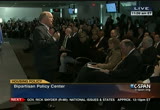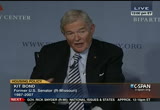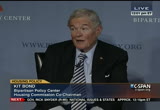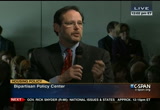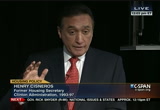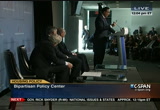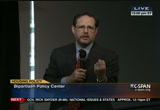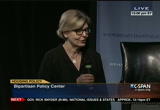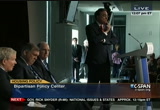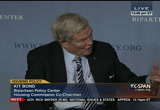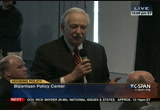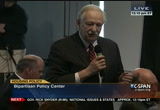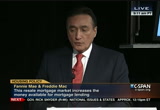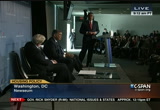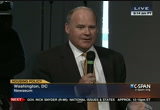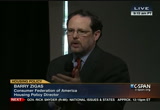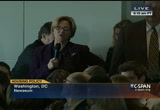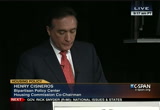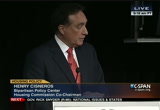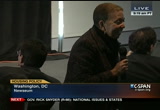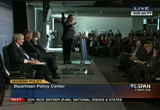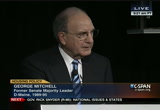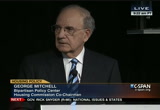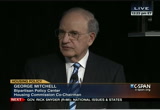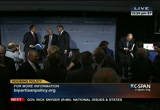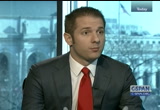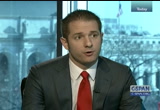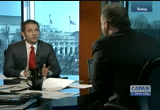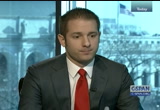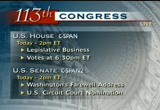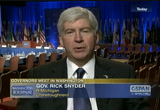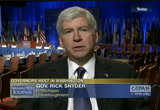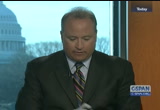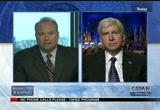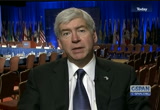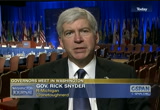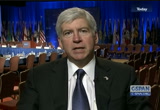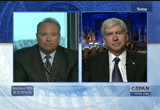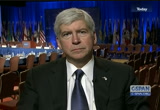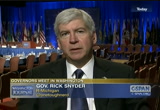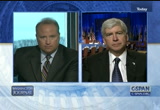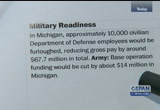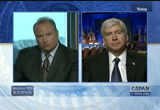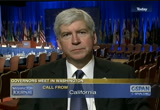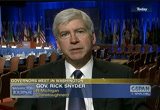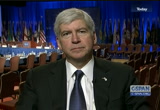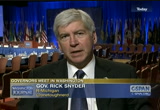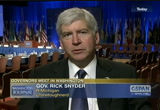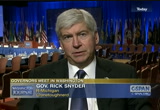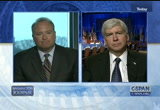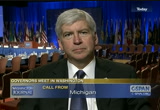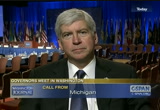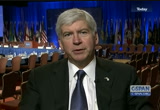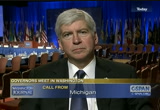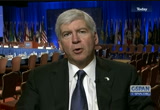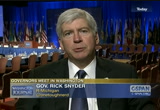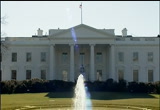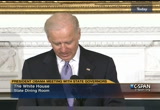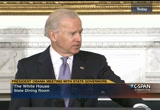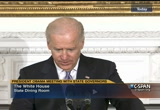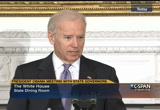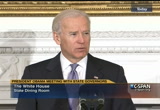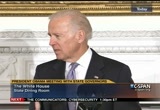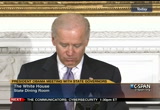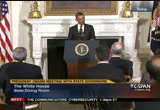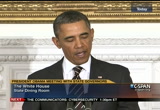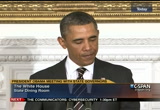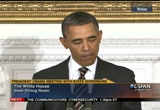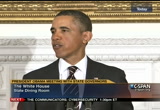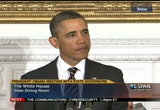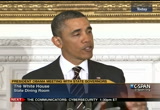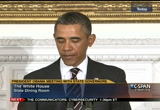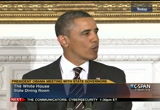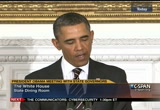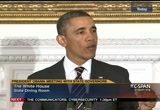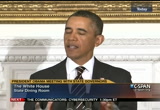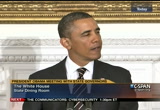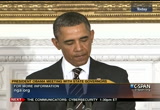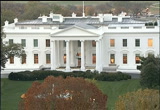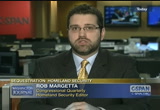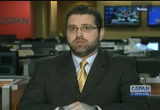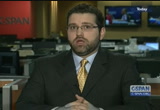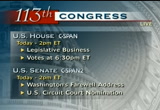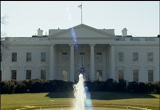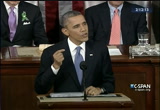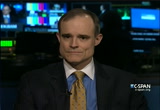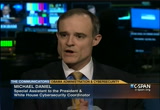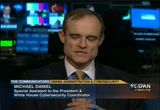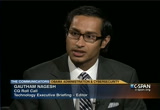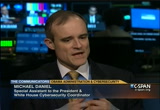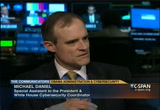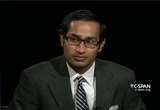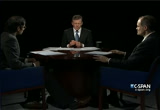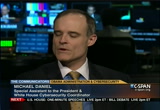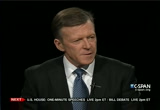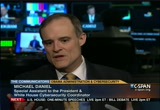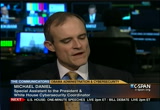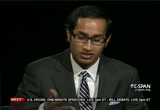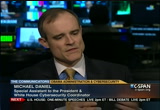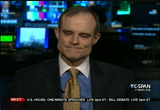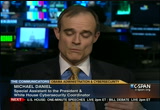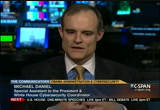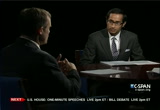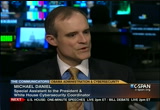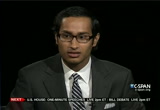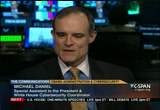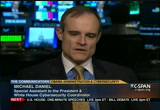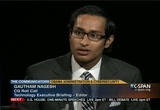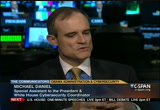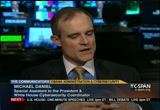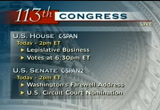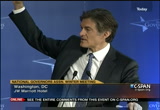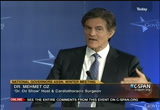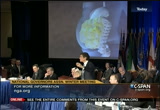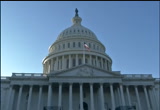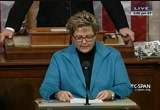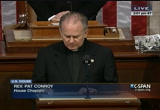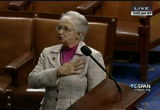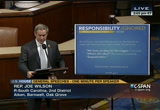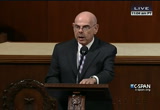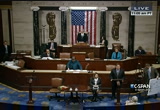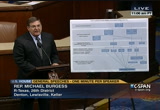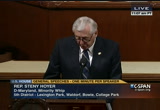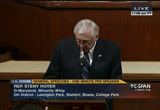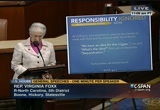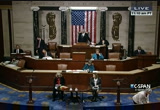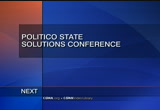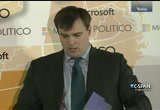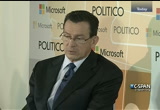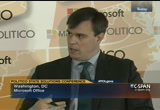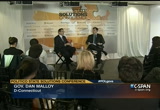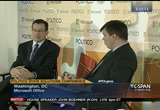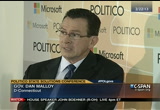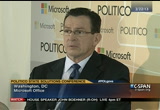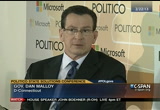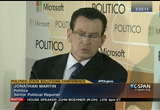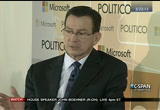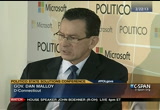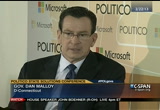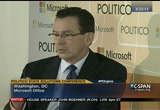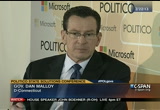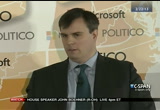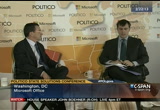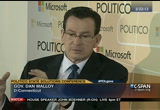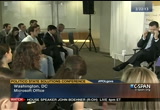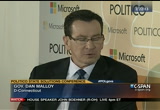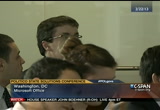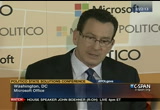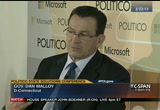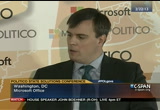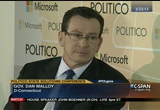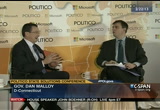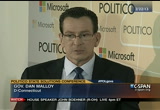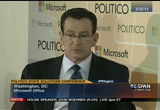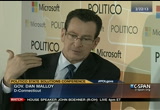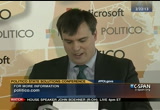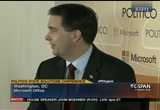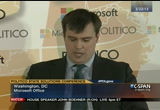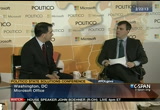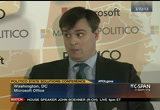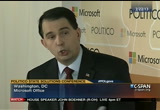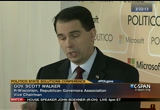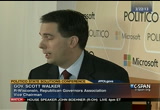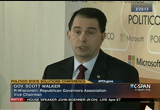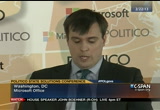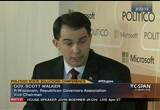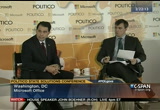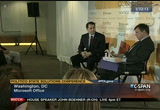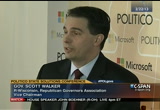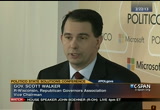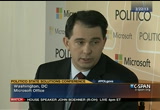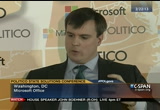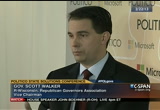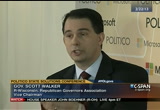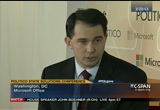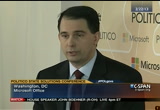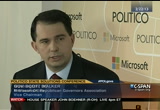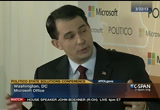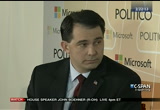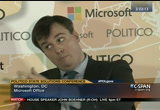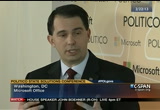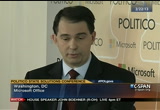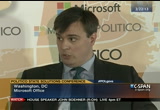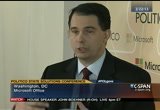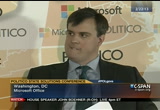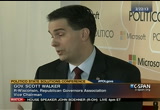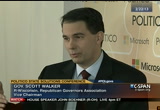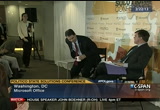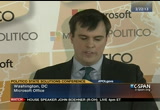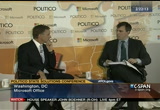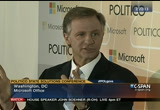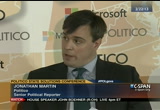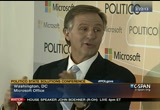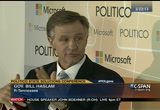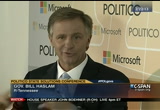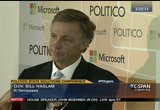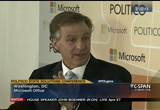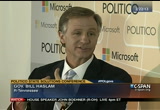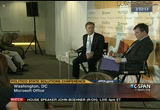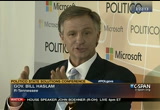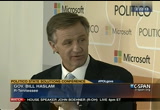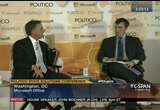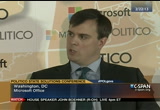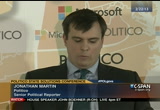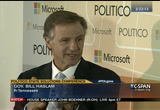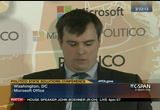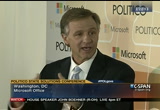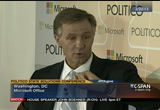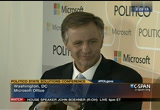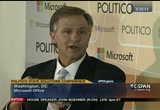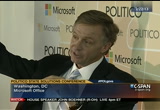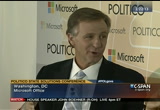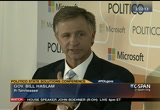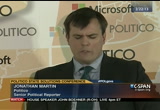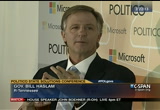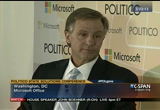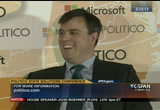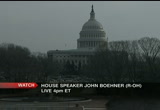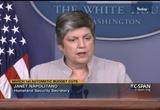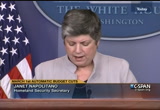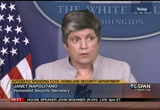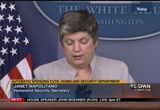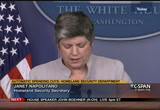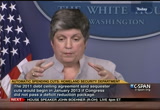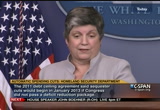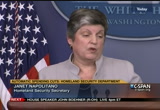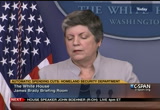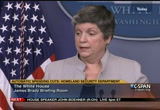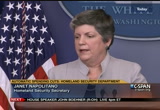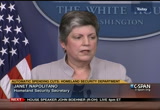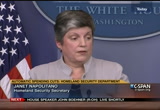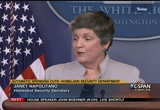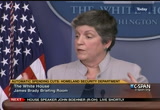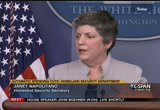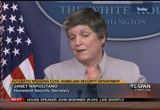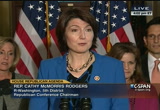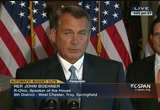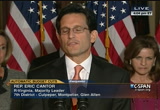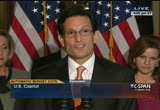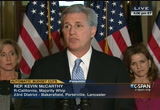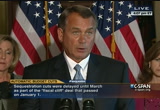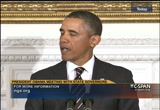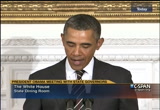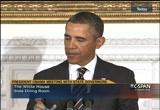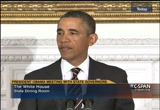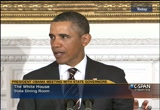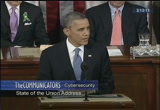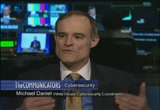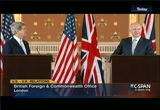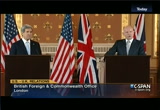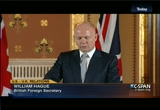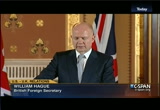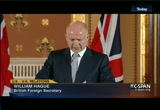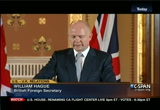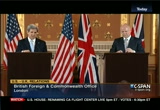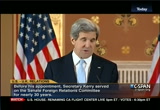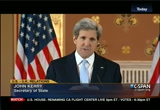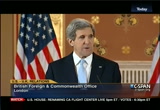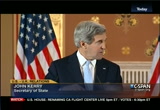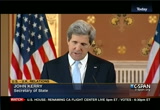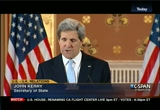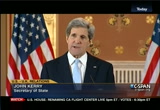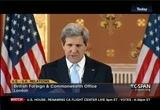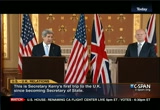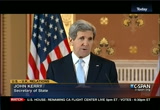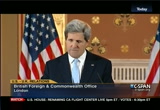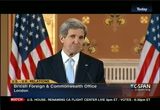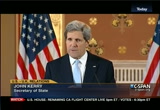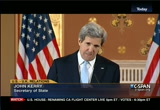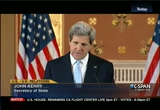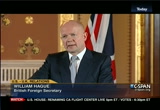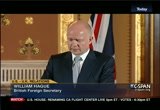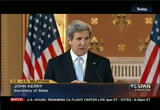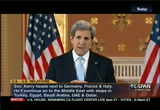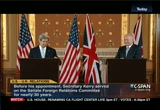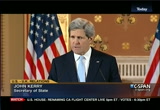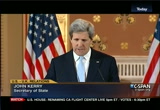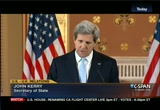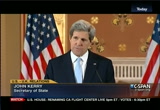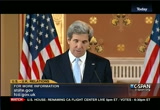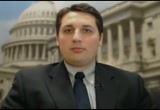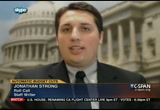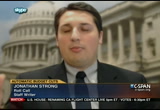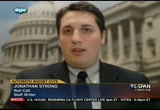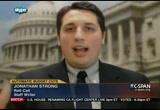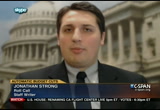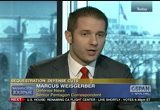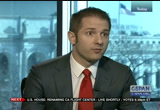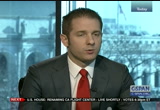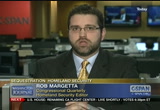tv Public Affairs CSPAN February 25, 2013 12:00pm-5:00pm EST
12:00 pm
, a broad grange of issuers and credit and answers, -- a broad range of issuers and credit and answers are in a line of field, it could be a subsidiary of a large institution but the entity that provides a credit risk enhancement would have to be in a model line in situation. line situation. >> we heard a lot from community region in st.ur louis and elsewhere. i live among community bankers. one thing i am personally convinced of -- if it is of the airplane is built, the community bank is in much better shape to meet the needs of the banking clients in their community. right now, they are telling us, it is not so much too big to fail. they are worried about the cost of dodd frank, which would
12:01 pm
involve hiring a staff of people to do the work and they say that the big banks can do that better. we hope that congress would look at that. there are a number of other things in the regulatory area that are bad. if they carry it further, it will make it dangerous for community banks to get any in the game. if congress will look at what the real needs are in the banking sector and and perhaps make it a lot easier for community banks, we certainly would like to see them thrive. it is not, from what i hear, that they are too big to fail. they are too small to compete with regulators. >> take a look at the material -- the gentleman who asked the
12:02 pm
question -- it begins on page 53 or so of the report or its bills of the scale and the hope that this could reach very deeply into institutions. barry, you had a thought on this question? barry is with the commission and, it is with the consumer federation. >> i wanted to make the point that this issue of access and affordability credit is a strong theme in the report. it runs to both the ability of consumers of all types and all places to have a fair and affordable access to credit through this system we are recommending. that is the whole point. and also for lenders not to be discriminated against. this is one of the roles that we envision a public guarantor will have to take on it, to make sure the system they are overseeing
12:03 pm
does not come to discriminatory outcomes, but keep some members of of the game. i do not think any of us would claim to have everything worked out, but we made the strong statement the system will not be successful without that and come. >> we have about 10 minutes of questions we could take. i would like to see if nan roma can put her thoughts together. in the question and answers section, we focus on the housing finance and also the demographics, which are two of the major, major problems of this report. but another part deals with the retargeting to the most needy. and barry and janet and others
12:04 pm
have played a major role in assuring that the neediest get the help that they can. this gentleman has had his hand up for a long time. then we will come back to you if we can. >> thank you, henry. mark willis, univ. of new york center for realistic policy. with a lot about homeownership. we talked about government programs. as all the commissioners, i'm sure, no, the majority of rental properties are in small rental buildings, not government subsidize any way. i wonder to what affects -- we can prefer -- we can preserve this part of our rental stock? >> would you like to take the lead in talking about the provisions that you led us to
12:05 pm
include? >> mark, thank you for the question. this is an area we address in the report. although i do not think we have any magic solutions. we may be very clear point that this sector of the rental economy is not well served by fixed-rate finance. it has not been well served by the gse's. >> the gentleman on television would like you to -- >> i thought i was answering your question. i guess not. [laughter] >> we do make the point that this sector of the rental economy of smaller properties, including single-family properties, is a critical source of housing. this is one of the major links of the house and finance section of the report and the rental section of the report. the focus is on the market value that makes it so hard for low- income tenants to afford the
12:06 pm
cost of these properties and the problems of higher cost that the owners of those properties confront at the margin because they cannot get access to the most affordable mortgage products. as henry said, we have to be prioritized and expand what the government invest in the rental and the structure of the country by helping support market demand by these renters as one of the two most fundamental linkages of this report. >> ok. since we're in the general subject area of rental recommendations -- and if any other commission groups, janet, and whoever else, would like to say a word about this. >> the commission was very concerned about meeting the needs of the lowest income renters. i think that was reinforced last week when hud came out with this number that showed 20% worst case housing needs.
12:07 pm
recommendation really is to meet needs of the most abominable people, people under 30%, a very median income, elderly people, disabled people, homeless people. to prioritize meeting that need, it does involve expanding a variety of suggestions of how that would be financed in a constrained -- up. unconstrained it spending. i think the commission, all of us had a will to make -- to meet those needs when we were building them under people who were vulnerable and to make sure they can continue to contribute to society. >> thank you. can you speak to this? >> i certainly would. nan has been at a champion for aid to the homeless and assisting the homeless for a long time, and one thing she has pointed out that we records in the report is the necessity to
12:08 pm
have social services provided with the housing. it is not enough to provide a shelter. a large number of the homeless require services, whether it is job counseling, education, babysitting. that is a critical elements. the commission report has sprinkled throughout the need to bring services to housing. i've been just add one thing to the professor's comments on rural housing. too often the federal government -- which you can take a look at housing -- 50 units are more. in our rural area, units and one for 49 are a lot fewer. -- one through 49 are a lot fewer. this is an area where state and local decisions can help make sure that housing needs of the
12:09 pm
people in the smaller communities, where a four-unit apartment house would be a big one, are adequately met. that there are community banks unwilling to reach out and make the loans. state line lihtc's in target resources to construct or rehab homes for the needs in smaller areas. >> bruce would like to say a word. he is a former congressman from connecticut. >> thank you, henry. i do not want to say anything different from what my colleagues have said. just to emphasize that the rental restrictions are by no means limited to the homeless. they are not just about people who do not work, but a large part of our population who work full-time and earn very little. 30% of median income, which is
12:10 pm
close to the poverty line, represents the coverage of people who are very poor, but trying very hard. the targeting we are talking about is focusing our assistance on ending the lottery that we currently have for we promise we will help people up to 80% of median and we deliver one in four. that is really not an acceptable way to run a government program. we have tough choices. these are very tough choices. at least we can deliver what we promised. that is targeting 30%, a very median. and helping most people secure private housing. this is a system that is not government-owned housing, but private housing. that is where most of the housing is and we need to make it more affordable. >> will take someone from this side, and i promised the lady over here. >> yes, ma'am? >> [indiscernible]
12:11 pm
>> i represent retired professionals and those in remain passionate about has in. when i started my career in 1960's, fannie mae and freddie mac were created to incentivize private lenders to lend to people who normally would not be eligible for finance -- housing finance. now that you are recommending that the private sector banks take on greater risk, they are not even fixing the problem that exists today, trying to help homeowners refinance mortgages. how's that going to work? i just do not get it. >> i think we are focusing on the elements that are keeping banks from being able to help today. the credit environment that
12:12 pm
helps today. we have suggested stabilizing the regimen of rules that banks work within so they can get back to lyndon. and then it of balding -- involving the banks in a way that has been stated repeatedly here, the government guarantor stands as of last guarantor, but an integrated system, a balanced system in which the rules are well established and it should allow for liquidity in the credit market. that is the belief we operate from. >> we believe without a government guarantor on the back end, liquidity will not be what it ought to be. it takes a secure sizing market to bring that about. however, it does not take of government-sponsored enterprise to achieve the goal we are talking about. i can recall, fannie mae was not meeting their low income housing
12:13 pm
goals. their lending to a whole different spectrum of people. for them to be lending -- what, $200,000, something in that neighborhood? that is not near the poverty level. but here is something else. it is not just about what we are discussing your to do. the qm rule just cannot, and the qm rule by itself will create an environment where it is difficult for the financial institutions to be lending outside the safe harbor people and you think about that, is qm going to broaden the pool of people that become part of the mortgage or constrain it? i'm not sure which way it is going to work. i think qm will play a significant role in banks and how they react. 20% down payment, fica scores in
12:14 pm
the 500's. these are things at some point that have to become more competitive. so, consider that in the light of qm, and not in the complexity of the current system. >> if you have a point, and i think barry does as well. >> one of the points you hit on throughout the meeting is the uncertainty in the marketplace. qm resolve some of that. i think the message from the commission is let's move this thing forward and get some of this was also the uncertainty is not there with the financial institution. from the guy on the street, part of the reason they're not in the game right now is they are not aware of the risk. what they are doing is trying to define a process to define those risks, so the government backing
12:15 pm
will allow people to get into the marketplace. it will understand how to price it and know the risks. i hope that will secure some of that. which like to say a word? >> i will be quick. for those who were not deep policy wonks, this qm rule is really about the direction that lenders should only make loans if they have a reasonable expectation it will be repaid. debts are meant to be repaid, and that is coupled with an admonition that lenders should lend responsibly for sustainable purposes. those two together have led to this qualified mortgage rule. why would anyone become a credit risk taker in this new environment at a price that would be affordable? all i can say is, the commission worried about this.
12:16 pm
we consulted with a lot of people in the field. we believe going forward, some of the issues began to fade. this is an effort regarding credit risk. it probably means that consumers will pay more than they paid in the past, but that is the price for a stable and sustainable system. we will have to wait and see how much more. we believe based on what work we did that it will not be too much. >> of the. final question over here. -- ok. final question over here. sheila? i did not recognize you, but i'm glad i call the new. sheila crowley heads the -- >> housing coalition. i want to commend the commission for its focus on the housing problems of extremely low-income renters, which get worse and
12:17 pm
worse every year. i appreciate the emphasis on trying to get assistance to all those folks. i wonder if you could operation alize that for us a little bit? how exactly might that happen? and in the report, we have heard that getting to do that would take some time. could you tell us what you think that period of time might be? " there are a couple key pages i would refer to you -- >> there are a couple key pages i would refer you to in the report. 1 is page 1 of 5. at the first step in operational lies in -- operationalizing is finding the cost that is recommended. that is an important part of the report. is a major theme in the
12:18 pm
commission for all work, that we were not going to put out numbers without indicating how it would be paid for. this is in the context of fiscal responsibility as we recognize it today. the first step is to identify what are the costs associated with increasing the low-income tax credit, rental assistance, gap financing for low-income tax credit, etc. the second page i would refer you to is page 1 of 7 that looks at the current distribution of federal support -- page 107 that looks at the current distribution of federal support and rental and appropriations of owners and rental. and again the report concern intends to think about how this might occur. after that operationalizing means specific changes in
12:19 pm
specific programs. changing the regulatory structure for public housing. focusing on this notion of outcome-based criteria and providers, competitive structures or providers to be as efficient as possible, etc. at least beginning of -- we are setting up the path to operationalizing. are there any co-chairs or commission members who would like to add to this? yes? renee? >> i was just going to add but clearly this is important, and the ability -- i'm sorry. i am not ignoring you, sheila. i am saying this is an important issue. the point that we talked about in terms of the performance- based system and having greater
12:20 pm
flexibility at the local levels to solve problems, because there is a correlation between cost and regulatory structure. i think there is a lot of the current momentum about getting the resources closer to the needs, and i think operationalizing it will really ought be about adopting those core principles, and i think the report is very strong on the outcome,de-concentrating poverty, better housing, better locations, so families can have a home ownership. >> thank you. any other commissioners wish to add a word? we have called on most. is there anyone else who would like to say something? yes, sir. >> [indiscernible] >> yes. absolutely. nick, who is now a professor at
12:21 pm
the harvard business school, former fha director in the clinton years, was certainly one of the most voluble players in the commission. i also want to point out senator alfonzo jackson. please stand and be recognized. [applause] i want to turn the podium back over to senator george mitchell. >> years ago, when bob dole, howard baker, tom daschle, and i gathered to establish the bipartisan by -- bipartisan policy center, we were dismayed to the extent to which our political process appeared to be in gridlock as a consequence of excessive partisanship and
12:22 pm
ideological posturing. that concern is heightened today. i frequently cite the example of the presidential campaign of 1800 when jefferson supporters called president adams a hermaphrodite, lacking, they said, the strength of a man or the gentleness of a woman. supporters said that its jefferson were elected, robbery, rape, and murder would be openly taught and practiced in our country. it was rough and tough when we were there, but it has gotten proper and tupper today. we at the bipartisan policy center believe it is possible that men and women with strongly held different political philosophies can come together in good faith to try and deal
12:23 pm
in a responsible way through principled compromise with the major problems facing our nation. one of our objectives is simply to demonstrate to the american people, to political officials of the country that it can be done. there are 21 members of this commission. if each of the 21 had offered his or her own report, it is almost a certainty that no two would have been alike and no one of them would have been identical to the report the commission eventually agreed upon. we do not present this as a piece of legislation. that will require action by congress and the administration. we presented as a set of ideas and principles which we feel give it content, recognizing any major decisions will have to be made through the legislative and political process. but we do presented as an
12:24 pm
example of what can be done in our country, and what our country now desperately needs. it is an approach that says you do not have to leave your principles outside the door to come inside and make a reasonable compromise that is best for the country. we can be strong partisans, and yet we are all americans. we all want to do what is best for the country. thank you but for coming and we look forward to working with you in the future. [applause] [captioning performed by national captioning institute] [captions copyright national cable satellite corp. 2013]
12:25 pm
>> with the $85 billion budget cuts called sequestration going to affect this coming friday, " washington journal" is talking with reporters about what will be cut. this morning, marcus weisgerber, about what will be cut. >> so, marcus weisgerber, what has happened over at defense? guest: everything will happend march 27 willuty is taking preparations for the $26 billion cuts between the end of march in the end of the fiscal year in december. host: or will the cuts come from? guest: everywhere, but not military personnel. host: break this down.
12:26 pm
guest: the procurement account and the research and development accounts, which are pretty hefty, they will be hit by the 10% cuts, but in reality, it will probably get hit a bit more, because the personal accounts will not be good, and the other thing is we are halfway through a year and they have not made any cuts to date. they have to make up for that. host: much of the cuts will be from the civilian part, especially in this part of the country. guest: there are 800,000 of them and they are all facing a 22-day furlough. that is about a day per week for the remainder of the fiscal year. host: what about the appointment around the world? guest: deployment will not be affected.
12:27 pm
soldiers in all wars and, primarily afghanistan, they will continue to be subject -- they will be continue to be fully funded. they will be subject to sequestration. but congress will have to take money from other places such as research and development and hardware and shipped that into the operational accounts of those folks out what they need. host: more figures from the associated press as far as the defense cuts, sequestration. a few examples. less air force flying hours, a cut in naval forces. at $3 billion cut in the military's health care system. the pentagon could be restructuring contracts. what do you want to say about those areas? guest: training is of cuts where only units preparing to deploy or other places -- these are the
12:28 pm
ones that will be training. everyone else, primarily in the air force and the navy, their planes will be grounded because it will not have the money they would use to do the training. it will be shifted into the war accounts to pay for afghanistan. stuff like tricare, i believe you mentioned, that is more like the benefits for care and being seen by doctors and whatnot. >> there are lots of voices in washington. what should we know about the defensive area? guest: there are two sides. there is the side that says we need to cut federal spending and the defense needs to take a roll. a lot of them would agree with that.
12:29 pm
the problem is, we're halfway done with the year and they have not been preparing for this. they will up to squeeze this into a six-month period. if it is fully implemented, it will have an impact. 2014, if it continues, and they get hit with another $50 billion cut, it will probably be more manageable, because they will be able to choose where they want to make the cuts. >> we understand the senate may come up with a couple sequester proposals this week. in the meantime, congress does return from its weeklong recess. the house is dabbling in at 2:00 p.m. eastern. we will of live coverage here on c-span. the senate dabbles in at 2:00 eastern. it will start with the -- gavels in at 2:00 p.m. eastern. you can see live coverage of the senate on our companion network c-span2.
12:30 pm
the arms control association speaks today with colonel thomas pickering about iran's nuclear program and possible solutions. >> at age 25, she was one of the wealthiest widows in the colonies and during the revolution, she was considered an enemy by the british, to threaten to take her hostage. later she would become our country's first lady at the age of 57. meet martha washington as part of our new series "first ladies -- influenced and image." we will visit places that influenced her life, including mount vernon, valley forge, and philadelphia. live tonight at 9:00 eastern on c-span, c-span radio, and c- span.org.
12:31 pm
>> state governors from across the country are meeting in washington for their annual conference. this morning, "washington journal talked with" minnesota governor rick snyder. this conversation is about half an hour. >host: on your screen, governor rick snyder. governor of michigan. of course, a participant in the nga meeting. guest: good morning. >> what is your take away from a week of meetings in washington? guest: your show is covering the big issue, what is going to happen at the federal level. that is a real concern. host: what are you anticipating?
12:32 pm
the white house is anticipating a drop in may for eight states. what are you looking at? guest: this issue of the sequester is a failure. when you look at the states, and that governor's meeting yesterday, as i looked around the room, probably most of us in the room had not had to do with budget cuts in two or 3 years. we got the job done. why can it not be done in washington? host: what can it not be done in a more effective way? guest: one of the things that i ate look at as a governor, we do need -- i looked at as a governor is when you need to get things done in a more effective way. need to cut the deficit.
12:33 pm
we need to have a better situation across the board for our citizens, our customers. we have to get away -- we have to get away from a number of the prescriptive programs. i'm not seem to block grants. wets do outcome-based programs. let's sit down and agree on five different programs based on outcomes and get rid of the old programs. that would reduce costs substantially. host: our guest will be with us for about 25 more minutes. he is the governor of michigan. he is a republican. we have a fourth phone line for folks in michigan. that number is -- we welcome your comments. i'm sure the governor does as well. since that white house report, they have decided to highlight teachers in schools. they point out that your state
12:34 pm
will lose about $22 million in funding for primary and secondary education, putting about 300 teacher and aide jobs at risk. just one of the areas -- can you speak more to that? >> that is the failure of the whole situation. this is what we are doing at the state. we have increased funding for education. it is more the point of getting back to the sponsor. this is not the right way to do cuts. they should look at priorities, working with us to find how we need to be more efficient. host: how would you describe the economy in michigan these days? guest: we a long way to go, but if you compare to where we were at, if you go back to 2009, we
12:35 pm
had 14% unemployment. so come up we were at the bottom for a decade. we are just going to keep going. host: where are the bright spots, and what areas of michigan do you just think -- which were better these days guest: most people know that autos are coming back. but things like agriculture are doing better. the biggest challenge, the mess here in washington. i think that is holding back a lot of investment. people are saying, if they do not know what the situation is going to be, they are staying on the sidelines. my number one concern is the federal budget guidelines. we have done this at the state level. let's get this done here. host: the unemployment rate
12:36 pm
nationally was 7%. in michigan in december, it was 8.9%. this from the bureau of labor statistics. the michigan budget is $49 billion be -- $49 billion. the proposal is $50.9 billion. guest: the reason for the increase is we are looking to get additional road funding. need to improve the roads. one thing we are really investing in -- early childhood. we have a major initiative over the next couple of days to put more kids through preschool. that is one of those great incentives, and really it can make us a much better state. at the same time, we are pulling -- paying down our debt. we are paying payment plans to
12:37 pm
pay off those long-term liabilities. that is critically important. host: one more question before we get to calls. this is about the medicaid expansion. they are right here -- what republican governors are saying yes. your name is here as a medicaid expansion convert. explain your thought process about this aspect of health care. guest: i would not say that i'm a convert. i'm a cpa. the real question is, is there enough primary-care capacity? right now, it is absolutely uncontrolled with emergency room visits happening far too often. it pays for society if you can get them in a primary care relationship. that needs to be the answer. that was the most critical
12:38 pm
thing. it saves it michigan money in terms of their state budget. this is just like you to at home. for copays, unexpected medical expenses. host: what has the what -- what has to rest of the health care law meant to michigan? guest: i do not think be affordable care act was the priority we should have worked on first and foremost. we are dealing with it. it is the law. the things we need to get to -- starting with primary-care. wellness. personal responsibility needs to be part of health-care. even in trying to lose a few pounds. host: calls for the governor of michiganb ofill is from an arbor, mich.. you are on it with your governor. caller: good evening, mr.
12:39 pm
snyder. you were supposed to go in and tell us -- i'm a retired union carpenter. we supported to. one of the things that you ran on was that you were going to be a uniter, not a diverer. you got elected, you raise our pensions, taxes, and we're in a situation where again and again, you told us that you were not going to enter into any discussions about the right to work, and now we have right to work. i read in the paper next year, they are going after the prevailing wage. i am in to my attention to retire. i made my plans. i did everything right. now i am trying to figure out how i have over $200 taxes starting last year every month, and now -- we did it right. we planned, we did everything we
12:40 pm
were supposed to do. now we're talking about raising. the roads, doubling the gas price? . i am looking at this guy who said he is going to be united and i am sitting here scared to death. host: that was built from ann arbor, mich.. governor snyder, what do you make of what one of your constituents had to say? guest: we had to deal with a huge deficit just like we're having the discussion of the federal level. we had to resolve issues. one of those things dealt with do we tax pensions and how we do that? we put in a system to grandfather ran the seniors who already have it. need a fair system, because we have people who still had to work as seniors, and then we had to think about the kids. i appreciate that. with respect to right to work, that was a topic i was not
12:41 pm
looking for, and that was a function of proposals coming into our states, a terrible proposal that would enshrine many things beyond collective bargaining in our constitution. really, it would have thrown our whole government offtrack. i appreciate the citizens voting that down. that would have been very divisive in our state. i think it will be good for michigan long-term. it is about standing up for workers and that will create jobs in michigan. we to have tough times because we have these issues. we were at the bottom for how many years? now we are coming back and we do need to work harder so we can all succeed. host: kathleen on the line for democrats for gov. snyder. good morning. caller: good morning. how is everybody? gov. snyder, can you explain
12:42 pm
martial law and if the sequester it does pass, when does martial law, and to place? can you explain marshall lot? thank you. host: -- guest: i appreciate your question. martial law is not something we are doing and i do not believe the federal government is. we have issues we need to address. we need to do this in a better way than having a harsh cuts across the board. host: more from the white house report last night as a relates to michigan and the sequester. they talk about the protections for clean air and clean water in michigan would lose about $4.9 million in funding to ensure protection against pollution and
12:43 pm
hazardous waste. anything to say there, governor? >> i appreciate the white house outlining the cuts. it is not just about congress. it is not just about the sequester system. why haven't they gotten the job done? why are they not making more thoughtful decisions as a team, working as the white house and congress together? that is their responsibility. the states have done this time and time again and we have done it effectively. host: the white house points out that in michigan about 10,000 civilian dot employees would be furloughed, losing gross pay of about $67.7 million in total. do you suspect that would impede the economic progress you weapon making, especially with the unemployment rate?
12:44 pm
guest: the deficit is not something that is sustainable in our country. the deficit needs to be addressed. it would be great if the federal code -- if the federal government could even get a budget un. guest: let's get everybody in washington, doing the job they were hired to do. again, there are smarter, better ways. as a state, i am happy to partner with them to say, we need to be more efficient. that is where i come back and say, let's do outcome based programs. let's put dollars to help our citizens. let's not have them spent by government to administer more programs. host: joe was calling from california, an independent. guest: democrats and republicans, one of the republic -- one of the problems is that if they look at cutting everything that means something
12:45 pm
to you, there are millions and millions of bureaucrats that are throughout the government that set in offices every day and shuffled papers -- shuffle papers. i was trying to look in my notes and find out, how many employees in the defense department does the federal government have? the number is something like 3 million or 30 million. that strikes me. that is an incredible number of people. how is it that all the people you see are the ones that are going to be cut, rather than the ones that are sitting in some office? guest: that is in line with some of my comments. those are the activities and the way we need to look at it. anytime you ask somebody to lose a position, that is tough. you never want to minimize that
12:46 pm
part of it. in michigan, we had a deficit. good people -- good people can up with good ideas. that was the michigan state police. we have a situation that come from the leadership of the state police, and when we asked them to take a budget cut, they got creative and said, we will close state posts across michigan. normally that would cause a huge it up or. what they said is, let's invest in technology and cars. we closed a lot of police posts, but we did not lay off any troopers. we put more sergeants on the road, going to the front lines, to be more present with customers or citizens, and we got rid of the overhead. that is the kind of thoughtfulness that needs to happen, rather than arbitrary cuts. host: a lot more stories about your largest city, detroit, and its economic issues. what is the future of that city? guest: detroit has many great
12:47 pm
things going on, young people moving in, some great projects going on. the challenge in detroit is city government. it is not a recent issue. there are good people in the recent administration. this goes back for decades. the city government is unsustainable in terms of its finances. it needs to provide better services. we have had a review team looking at the finances. one of the question it asks is, do we need to take additional steps to get detroit's finances together? -- working better? oddly partner with the city to get that happening? detroit will be a great city again. that is critically important for the future of michigan. caller: what is happening in detroit is disgraceful. look. you run for office.
12:48 pm
you get in, you get that power, and all good ideas run out of your mind. it seems like all of the government, including state, is bought and sold to the highest bidder. you start off with a decent salary, and then when you all come out of office, your millionaires. who pays? it is always the people at the bottom. you can do better than that. host: let's hear from our guest. guest: a lot of us are doing it to help people. that is the point. i am proud of the fact that i never held office until recently became governor. this is about making a difference. that is why i thought it was valuable to leave the private sector and bring some of the good ideas about how to better manage government and bring them into government. we're being more thoughtful, more accountable. the way i describe it, we need to do a better job in the public sector.
12:49 pm
coral government is customer service. my customers are the 10 million people of michigan. when i talk about the people of michigan, i talk about them as my customer. we need more of that across the country. host: governor rick snyder is in washington before the national governors' association is having its big annual meeting. here is one comment via twitter. one viewer wants to know -- guest: one of the great things about states -- we are the laboratories of democracy. we have 50 different states. people do things differently. the value of being a governor is the chance to talk and listen to other governors, new, innovative ideas or understand issues that they may see ahead of what what we might see.
12:50 pm
we can jump on them together. that works out pretty well. i found a number of cases -- i was talking about health care, where i have seen other states look at ideas on lummis that are clear -- that we're not doing in michigan, and we're going to do them. host: one listener once clarity on your comments about detroit. "does that mean the governor is going to take away the opportunity of the citizens of detroit to a vote for their local government?" guest: in michigan, we have an emergency manager lot. it deals with - manager law. i need to make a determination are not in the next 10-20 days, do we have an emergency in detroit? then we might move to an emergency manager. i have not made that determination. that is something any to do in the next couple of weeks. host: there is a headline in the washington post --
12:51 pm
12:52 pm
i don't take credit. i was hired to solve problems. when it comes to working with the federal government, i do not fight with them. i do not blame them. we have to work together because we have a common customer. i want to deliver great results. i have not changed my position at all. i never criticized the president. i do not view that is my job. my job is to take care by customer. the best way i can do that is to have a reasonable relationship with the president, to say, how can we work together? i think that is appropriate. host: are republican named john is on a line from michigan. caller: governor, would you suggest that our nation's lawmakers in washington, d.c. to the same as a lark -- is our lawmakers did in lansing? that is to raise taxes to balance revenues and expenditures. guest: 1 did the budget deficit, we made a greater -- we made major reforms, but we also made net cuts to revenues.
12:53 pm
we did some difficult things. we worked for it in a positive way. you can see the outcomes of that. we have been growing. one of the things holding breath -- growth back is the fact that the sequester -- the sequester is a bad idea. we're not even getting a budget down. think of that. what the budget done so we can move on, have better certainty, and we would grow better if both things were accomplished. caller: i think you have a short memory. your -- do you remember and color have in a $1.7 billion surplus that he gave away to the 47% of rich people in michigan? i think you're trying to turn michigan into florida. kenya least set up reservation for us? -- can you at least set up reservation forecast -- for us? guest: we're trying to put dollars back into rainy day fund.
12:54 pm
we had a rainy day fund at $2 million. it would last about 30 minutes to run state government. we're up over half a billion dollars now because we need to be putting money aside for the future and unexpected challenges and issues. we're going to keep coming back. things are improving. we need to work hard so everybody has the opportunity to see that. host: here is a tweet -- guest: i can tell you on road funding where we need to make an investment -- we have been a donor state. we have a tougher climate. i cannot figure out any reason why we should be a donner state for roads. -- donor state to roads. it is a case of, let's not pick
12:55 pm
winners and losers. host: clinton township, mich., a republican. good morning. are you there? caller: good morning. thank you for taking my call. i appreciate talking to the governor directly. the economy is bad, but i would like to make a point about the second amendment and the constitution in general. the governor and the rest of the lawmakers in michigan have the right to secure the right to bear arms. it seems like there's a big push to not only take away the second amendment, but also to restrict many amendments, let alone the right to bear arms. the economy is a bad thing, but if we do not have the second amendment and the constitution, i would like to know what the
12:56 pm
governor would do to restrict -- to allow the second amendment, to separate ourselves from the federal government, saying they do not dictate to us what we have as law-abiding citizens to protect ourselves, our homes, our property? host: before you answer, i wanted to show the audience a headline. i wanted you to explain this thinking, rick snyder of vetoes a bill that would allow guns in schools. this was a bill that would allow concealed weapons in schools, day care, sports arenas, places of worship, dormitories, and casinos. this is from "the washington post" -- guest: i think michigan has a good set of gun laws. i do not think we should be spending our primary time on this. we have made some improvements. to go to that bill you mentioned -- it was going to allow
12:57 pm
concealed weapons to be taken to all those different venues. my view was is that there should be a local option or the people locally can make the decision, do they want them or not? it was a balance on both sides. the issue i found missing was, i thought the local people should have the best value of knowing what was best for them. let them make that decision. that was not part of that legislation. the overall gun question -- that is coming up a lot these days, because of these terrific -- horrific shootings. these are terrible tragedies. one of the things i have focused on, i think this should be a focus on mental health, that is where we should be spending our time. how we deal with that more effectively, particularly with young people and more people could be future shooters? that is something we looked at in our budget.
12:58 pm
i believe mental health is our most important issue to address. host: our guest is rick snyder, in washington as part of the nga meetings. we appreciate you taking the time of your time -- the time not to talk with us this morning. guest: but agreed to be with you. thank you. >> facing a friday deadline of billions of spending cuts known as the sequester, president obama held a conference here in washington. speaking at the white house, the president said congress can avert a sweeping, across-the- board cuts with "just a little compromise." key is joined by vice president joe biden at this event. -- he is joined by vice president joe biden at this event. [applause]
12:59 pm
>> thank you. thank you. i tell you what, i did not know jack was as good as he is. jack, if you had done that -- jack, if you had done that, i would be introducing you hear. thank you but all, very, very much. you are all much more disciplined than the place that i lived for 36 years up on the hill. you run ahead of schedule. the president is with me. thank you for being here. we have a lot to work done, from fixing a broken immigration system to rebuilding our nation's infrastructure to this new board everyone in america is learning about "sequester." this town, unlike maybe your capitols, is i hope temporarily
1:00 pm
frozen and not stopped in intense partisanship, the likes of which i have only seen the last couple of years in my career. but you know, the american people move in different we disagree on some things. the american people have been moved. they know the possibilities for this country are immense. the are no longer traumatized by what was it traumatizing event, the great collapse of 2008. there are no longer worried about our economy being overwhelmed by europe at large or china somehow swallowing up every bit of innovation that exists in the world. there are no longer worried
1:01 pm
about our economy being overwhelmed beyond our shores. there is very little doubt in any circles about america's ability to be in a position to lead the world in the 24th century. -- 21st century. the american people are ready to get up as a civil-rights leader. the american people are tired of being tired. they're ready to get up and move. we are in a good position to lead the world. that is why i think they're so frustrated by what they see and what they don't see here in washington.
1:02 pm
their frustration is turning into anger. i doubt an interesting dynamic. whether it was a democrat for governor republican -- governor i heard from several of you how do you deal with this? how do you deal with the congress. no distinguished about how you deal with this. you deal with legislatures that are split. you represent a minority party. you get on very well. the accomplish things and are state. that is the way it used to work. there are a number of things we have to do immediately. we may disagree on how to dress them but not the need for them
1:03 pm
to be addressed. each of you are making different decisions you are grappling with it. i do not think there is much different. i'm not mad a governor from the time of implementing the recovery act and on my cell of a -- and on now who does not think we have to do something about our infrastructure. there is very little disagreement to build an education that has such immense possibilities for our people. most of these issues were united by more than what divides us. these all intersect at a place where both the state and federal
1:04 pm
governments engage. we are going to have to work together. they overlap in many cases. we will have our differences. we should all agree that the united states has to have the highest percentage of college graduates of any nation in the world. you governors have led the way an early education and the consequences for the prospect of success. you have all led in knowing that we have to have a reform of our high school system so we end not only finding it that way for people that will go to four year colleges, a but there is so much agreement that we ought to be able to get a fair amount done. we should all agree that to grow our economy we have to invest in
1:05 pm
manufacturing, infrastructure, the question is to invest and how much. there's not much disagreement about the need. i've never met a democrat or a republican u.s. been a governor who does not think the american people should have a sense that hard work will be read -- rewarded. the work party have an opportunity. i do not know of any men and women that are a better living example of that and all be sitting in front of me. we all use the phrase move forward in a balanced way. another man's a balance is another is in balance. that is what we have got to talk about. the one thing i do not think any of the lack is a vision about how great this country can be. we ought to be able to reassert
1:06 pm
ourselves in a way that we own the 21st century. i know the guy i am about to introduce believes that but you do. let me injured -- introduce you to the president was back with the pastry chef. my friend, barack obama. >> thank you. have a seat. thank you. welcome. thank you for being here. we all have a lot on our plate. everything from our immigration system our education system our goal is to make sure that we can be an effective partner with you. i want to thank the members of my cabinet q. are here and members of the administration.
1:07 pm
i want to thank jack and mary for their leadership. i want to say thank you for being on their best behavior last night. i was told nothing was broken and no silverware was missing. i did not get any calls from neighbors about the noise. i cannot speak for joe's after party. i heard that was wild. i always enjoy this weekend. as leaders we share responsibility to do whatever we can to help grow our economy entry good middle-class jobs and open up new doors of opportunity for our people. that is our true north. it will guide every decision we make every level. we should be asking ourselves three questions every day. how do we make america a magnet for good jobs, how do we equip our people with the skills to
1:08 pm
get those jobs and how we make sure if they get those jobs that their hard work actually pays off. you are the ones who are on the ground, seeing firsthand every single day what works and what does that work. that is what makes you so indispensable. what ever you party ran for office, it is one thing that unites all of you. that is the last thing you want to see is washington get in the way of progress. in just four days congress is poised to allow a series of arbitrary budget cuts ticket then that will slow our economy, eliminate good jobs and leave a lot of folks who are thinly stretched scrambling to figure out what to do. this morning he received a report outlining exactly how
1:09 pm
these cuts will harm middle- class families in your state. thousands will be laid off. tens of thousands of parents will have to deal with finding child care for their children. hundreds of thousands will lose access to primary care and preventive care like flu vaccinations. tomorrow i will be in the tidewater region of virginia where workers will sit idle when they ought to be repairing ships. the uncertainty is already having an effect. companies are preparing layoff notices. families are preparing to cut back on expenses. what you are in town, i hope
1:10 pm
that you speak with your congressional delegation and remind them exactly what is at stake and exactly who is at risk. here is the thing. these cuts do not have to happen. congress can turn them off any time which is a little bit of a compromise. democrats need to acknowledge that we will make modest reforms in medicare if we want the program there for future generations and if we hope to maintain our ability. i have made this commitment. it is reflected in proposals i made last year. and make those remarks for smart spending cuts. we need republicans to adopt the same approach to tax reform that speaker john boehner champion two months ago.
1:11 pm
under our concept of tax reform and nobody's rates would go up. we would be able to reduce the deficit by making some tough, smart spending cuts in getting rid of tax loopholes that benefit the well off and the well-connected. sometimes folks in congress think that compromise is a bad word. they figure they will pay a higher price at the polls to working on the other side. as governors, some of you know that compromise is essential to getting things done. making smart choices, that is how gov. o'malley put it on track to all but eliminate the deficit while keeping tuition down and making the public schools among the best in america five years running.
1:12 pm
that is how the governor balance his budget last year was still investing in key areas like education for tennessee's children. they know we cannot just cut our way to prosperity. alone is not an economic prosperity. you have to make the tough choices to cut what we do not need so we can invest in the things we do need. the first is infrastructure. this should be a no-brainer. the schools are falling apart. it is what i have to do the best with transportation and communications networks to their businesses and customers.
1:13 pm
i talked about this in my state of the union address. to the people to work right now like the structurally deficient bridges across the country. it attract private capital to upgrade what our businesses need most. modern ports to move our goods. modern schools that are worthy of our children. i know some people oppose any idea i put forward. rebuilding infrastructure is not my idea. it is everybody's idea. it is what built this country. this makes clean energy structure a top priority.
1:14 pm
folks who think spending really is the biggest problem should be more concerned than anybody about improving our infrastructure right now. we're talking about deferred maintenance. we know we will have to spend the money. he said failing to maintain our roads is not a plan for being fiscally conservative. it is true all across the united states. we could be putting folks back to work right now. we know contractors are begging for work. they will come on time and under budget which never happened. we could make a whole lot of practice right now on things we know we're going to have to do at some point. it is like fixing a row for a broiler that is broken. one of the biggest hurdles that you face when it comes to fixing
1:15 pm
infrastructure is red tape. oftentimes that comes out to washington. sometime we shave the timeline. regional teamsp that will focus on some of the unique needs each of you have in various parts of the country. we're going to help the pacific northwest to a faster and renewable energy projects. we will help the northeast corridor faster on high-speed rail service. we will help the midwest and other states move faster on projects that help farmers deal with worsening drought. we will help states like north and south dakota move faster on oil and gas production. all of these projects will get more americans back to work faster. we can do even more if we can get congress to act.
1:16 pm
the second prayer someone to talk about his education. particular education the start of the earlier stage. i want to partner with each of you to make high-quality preschool available to every child in america. this is an area where we have already seen great bipartisan work at the state level. how vicious in a state to highlight this issue because georgia has made it a frigid i was just in georgia to highlight this -- i was just in georgia because they are making it a priority to fix this. kids that are poor are leveling up. everybody is seeing a real improvement because it is high- quality, early childhood education. studies showed the sooner children begin to learn in these settings the better he or she does down the road. we all end of saving money. fewer than 3 in san for your old
1:17 pm
are enrolled in a high-quality preschool programs. most middle-class parents cannot afford a few hundred dollars a week in additional income for these kinds of preschool programs. poor kids who need it most black access. that lack of access -- lack access. every dollar we invest can save more later off. this is a priority in alabama. gov. schneider's making it a priority in michigan. tomlin has made it in west virginia. even in a tight budget, republicans and democrats are focused on high-quality, early childhood education. we want to make sure we can be an effective partner. we should be able to do that for
1:18 pm
every child everywhere, a democrat, republican, police state, read state. all of us want our kids to -- blue state, red state. all this want our kids to do that. that will be better for every state. it will be better for this country. that is what high-quality early trotted education can deliver. i hope you are willing to part with us to make that happen. let me close with this. there are always going to be areas where we have some genuine disagreement. here in washington and in your respective states. there are more areas where we can do a lot more cooperating then i think we have seen over the last several years. to do that this town has to get past its obsession with focusing
1:19 pm
on the next election in some of the next generation. all of us are concerned about our politics both in our own parties as well as the other parties. at some point we have to do some governing. certainly what we cannot do is keep careening from a manufacturing price crisis to crisis. the american people have dug long and hard to get out of one crisis. they are meeting their response abilities. they are giving it their all. alloted you are doing the same things in your respective states. we have the same kind of attitude here in washington. the american people have a right to expect that. it is not just to shrink in our
1:20 pm
economy for the short-term but to reignite what has always been the central premise of america's economic engine. that is that we build a stronger thriving middle-class where if you work hard in this country, no matter who you are or what you look like, you can make it. you can succeed. that is our goal. i know that is the goal of all of you as well. i look forward to our partnering. what i want to do is clear out the press so we can take some questions. thank you. [applause] [captioning performed by national captioning institute] [captions copyright national cable satellite corp. 2013] >> the federal government begins $85 billion in across the board cut called sequestration this coming friday. "washington journal" is talking this week with reporters on what it means. we talk about how sequester cut will affect the homeland's security department.
1:21 pm
>> walk us through this what is galling to happen beginning this friday? guest: you are talking about cuts with every agency at the department. you are talking about furloughs of 12 to 14 days for front-line workers, customs, border protection. you are talking about cuts to border staff. you will see lines increase at border checkpoints and customs lines at the airport. tsa is one agency where the federal government does interact with the public. the department has said at the busiest airports, you could see checkpoint lines increased by up to one hour. fema has said they will have to
1:22 pm
decrease their disaster relief fund money. immigration and customs enforcement has said they will no longer be able to maintain the number of detention beds that congress requires. host: what is the size of homeland security at this point? can the agency to absorb these cuts and still do the work it needs to do? guest: the secretary has said this is a hit that they can take and maintain the current level of operations. she described this as destructive cuts and one that no amount of planning and will help them get around. with cuts, they say we will try to preserve security and cut around to see where we can find savings. this is one area where the department has said it will have some impact on security and the economy. host: what impact do you think it will have on security realistically? guest: it is hard to say. you have the border patrol
1:23 pm
saying they will have to cut back on agents. that is a significant number considering congress requires they have about 21,000 in both categories. when you are talking about border security, we see a lot of drug trafficking and illegal immigration trafficking. it is hard to see where there would not be some impact when you are looking at that kind of hit. host: you mentioned the broader economic impact of world. what are you looking out? guest: that is a bigger concern than security. the travel industry is very nervous about this. they rightly point out that when air traffic slows down, a kind of become the target for this.
1:24 pm
they are afraid they could become the face of sequestration for the average person. when it comes to a cut in the government, the average citizen may not feel much of an impact. when they go to the airport and have to wait an extra hour, they will feel that. you are also talking about the southern border issues. a lot of people think of that as just a security issue with illegal immigration and that kind of thing. that is an area where trillions of dollars in commerce flow over every year. every minute that this slows down is millions of dollars worth of trade. >> the house to me that took what p.m. eastern today to consider a bill renaming a california flight center for the first man on the moon. the senate also gambles -- alison at 2:00 a.m. today. later in the day a judicial
1:25 pm
nomination. you will be able to see live coverage on c-span2. the arms control association talks today with thomas pickering about iran's nuclear capabilities. c-span2 will have live coverage starting at 2:00 p.m. eastern. a first series gets under way tonight with a look at the life of martha washington. we will be gamut her like before george washington and we will show you some of the places that influence -- we will begin with life before george washington and we will shamshow you some of the places that influenced him. >> up next, michael daniel talks about the president's cyber security order issued about a week and a half ago. reports of an increasing number of cyber attacks on u.s. from china. this is about half an hour.
1:26 pm
>> beginning with a state of the union address earlier this month, president obama began playing a framework for enhanced cyber security protection. here is a him from earlier this month. >> we know companies like our corporate secrets. now our enemies are also seeking the ability to sabotage our power grid, our financial institutions, our air traffic control systems. we cannot look back years from now and wonder why we did nothing in the face of real threats to our security and economy. that is why earlier today i signed a new executive order that will strengthen our cyber defenses by increasing information sharing in developing standards to protect our national security and privacy. >> in the president's executive
1:27 pm
order of february 12, 2013 he talks about vital infrastructure. how is the white house defining vital? >> it is defined as if something really bad happened to, lots of bad things would happen in the real world. potential a loss of life. in the cyber realm in means you could have that the resulting physical effects in the real realm. >> a lot of those infrastructures are in private hands. >> the vast majority of them are. >> will these private companies have to participate in this enhancement? >> for the most part it to be a voluntary and collaborative process with them to participate.
1:28 pm
if you look through the executive order and follow how the ring work is laid out -- framework is laid out, there is a process with the national institute of science and technology leading a process to develop the framework. then the department of homeland security will encourage adoption of that framework. at the same time, the primary regulators will look at their regulations and requirements and assess relative to that framework that is being developed. they believe that their regulations -- if they believed their regulations are not sufficient in that area, they could in theory proposed new regulations that would require infrastructure to be brought up to that level. you'll find that it is a voluntary process for companies to participate. >> there are some deadlines in this executive order.
1:29 pm
will congress have a role in developing this cybersecurity? >> for the executive order, that is driven from the executive branch side. from our perspective, the executive order, there's a down payment that we ultimately need to get to. we viewed the executive order that will be going on underneath it is advancing the cause of cybersecurity and advancing some of the issues that were raised in the congressional debate previously. we still need congress to enact legislation in cybersecurity. >> as a white house cyber security coordinator, what is your goal? >> i describe my role as the chief calf herder. it's my job to oversee the
1:30 pm
policy development as related to cybersecurity and work on ensuring the agencies are implementing the president's policies in the space. there is a chunk of my job that is an outreach to the private sector and industry and academia in the space. there's also an aspect that is international in talking to my counterparts in other countries from great britain to canada to germany and other parts of the world as well. >> also joining us is a guest who is editor of executive briefing. >> thank you. >> how well the executive order improve? what would be standard to improve cybersecurity? >> if you look at what we are doing, it is taking the best practices from the leading
1:31 pm
companies that do cybersecurity well and studying those -- and spreading those out to companies that do not do it well yet. what you will see is that it is about taking a lock of the standards that are out there, the practice is well known, and putting them together in a well-known framework that the company could adopt. this will enable companies to have a more rigorous process to make sure the cybersecurity is where they are and what they need to be doing. it will help close a lot of the known vulnerabilities and access at bad guys have right now. >> is as similar to security practices that federal agencies have in place right now? >> it would be related. you would see the same kind of diversity that you see in the or or. -- in the private sector. some are much further along than others. they want to raise the bar there as well. there are parallels.
1:32 pm
there are differences in how the private industry operates and how the government operates. it will surely be different, but you will feel parallels. >> there is a law to govern how companies should secure their systems. has that work? if so, -- >> it has worked, but it needs to be updated. it moved the ball forward for that time period, and now we have a more sophisticated understanding of what you need to do in cybersecurity. one of the things that needs to be updated is a move away from a compliance model were you periodically go back and check everything.
1:33 pm
that will not work now in the modern cyberspace age should things move -- in the cyberspace age. things move too fast. what are your vulnerabilities? have you done all of the necessary patching? you would have all of that information in real-time. >> one of the main stumbling blocks on cybersecurity is that the industry believes that any regulatory regime might resemble it in that it is more focused on complying. how do modify those concerns? >> one of the things we have done is that we are in the process of a reach with industry and academia. we have held dozens of meetings -- more than 30, actually -- with groups and companies. we have stressed that we want a
1:34 pm
process that is very collaborative. it does not do us any good to put out a compliance model that they cannot comply with or do that does not make sense in their business environment. the goal is to improve cybersecurity. i would say that the other thing that you can do in the executive order is that it is is designed to be highly collaborative and have industry be the one that is defining those standards. >> michael daniel, in the information sharing, you're right it is the policy of the u.s. government to end prove the and quality of cyber -- improve the quality of cyber security.
1:35 pm
our u.s. entities required to share my information with the government as well? >> the president can only direct executive branch agencies to take action. under the executive order, only the entities are on the federal side. we would like companies to share more information with the federal government. we are working to encourage them to do so. we are working to have that happen. that is an area where we need legislation to deal with some of the issues that are in that space to enable more information to flow back to the private sector and to the government that the text privacy and several -- protects privacy and civil liberties. >> the word voluntary is used for currently.
1:36 pm
>> yes. we look at the issues that we face in cyberspace. if you look at the problems and how the government has to deal with them, you see no one agency can deal with it. and needs to be a holistic approach. it is not just the federal government. it is federal, state, and local governments that deal with this issue. it also involves the private sector. it needs to be a collaborative approach from all parties involved working together to tackle the problem. we are stressing the voluntary part because it is the leaders in the industry that we want to come together that have expertise and the skills to make a difference. >> what are some concerned you have heard about cybersecurity
1:37 pm
from either companies such as banks and electric companies, etc.? >> you hear a lot of different concerns. one of the concerns that we hear and you see it reflected in timeliness, you shared information with us that happened three months ago, but what about now? we are trying to increase our timeliness to we are ahead of the issue. we are making progress in that space. over the last year, we have improved our ability to share information with the private sector. i also hear concerns from different sectors about ensuring that the other sectors that they rely on also are increasing their cybersecurity.
1:38 pm
if you are a wink, you are reliant on water, power, -- if you are a inc., you are reliant on water, power, and transportation to do your business. we want to make sure all of these are moving together to increase security because everything is interdependent. >> you mentioned that there are currently some barriers to government sharing information with the private sector. what are those legal obstacles? >> the fact that you mentioned barriers to the private sector side, those are more about policy and how we implement it.
1:39 pm
one of the things you see the executive order is that we can ramp that up on the president's site. -- side. in the other direction, there are essentially carriers to information sharing with the government based on liability. there are concerns about company sharing and competitiveness issues. i think from the administration respective, there are laces that we want to have with congress on these barriers to information sharing coming back into government and between companies. one of the things i have discovered working on these issues is that when you're willing to get down to the real barriers, they are often more limited than what appears. we want to be careful that we do not overshoot in legislation. >> you bring that up because the cybersecurity and trade secrets -- what would allow
1:40 pm
companies to come to the government? >> what it does is that it puts in place the foundation to ensure that we can deal with information when it comes into the government to protect by the sea and civil liberties. -- protect privacy and civil liberties. i think that will give the community much greater assurance that the government can protect them properly handle information relating to cybersecurity when it comes in. that should help encourage people or companies to have some confidence that we can handle the situation on the federal side.
1:41 pm
this will be a continuing conversation he treated the administration and congress on how to lay out the legal foundations and friend mark -- conversation between the administration and congress on how to lay out that legal foundations. it is a time-consuming process. >> what kind of concerns are you hearing from members of congress about his executive order? >> in general, the reaction has been positive. i think most of the members, certainly on the democratic side and even the republican side, we have seen a willingness to talk and openness to discuss how to move forward with this and to help that implementation as effectively as possible. >> section 7 c. protect individual privacy and
1:42 pm
civil liberties. how do you protect business and individuals civil liberties? >> a lot of that has to do with when you look at the way information needs to be shared, it is about making sure that only be appropriate and necessary pieces of information get shared and are moved within the government. we need to establish the rules in the later criteria for when specific pieces of information will be shared and under what conditions. what that means is in many cases for a lot of parts of the government, you do not need specific names or attributions for specific individuals. you just need the broad outline for the incident that occurred. in those conditions, only that information would get shared.
1:43 pm
in other cases, law enforcement would need that information. they have a long-standing procedure to protect that kind of information once it is part of an investigation. this is about the procedures that are largely present in the government, but making sure we are functioning efficiently. >> michael daniel, a lot of new stories about china. headlines are often china has attacked x. big cover story in bloomberg as well. is this policy directed toward china? >> no. it is not directed at one specific country. it is addressing the broad range of threats we face in
1:44 pm
cyberspace. it could stem from domestic or overseas actors. it does not targeted at any one individual country. >> when we see headlines that say china attacks, what does that mean? >> it is hard to speculate on what might be behind some of that. it is undoubtedly true that we have seen actors that are based in china that carry out activities, but we have seen that in multiple countries around the world. the attribution problem continues to be difficult in cyberspace. from the administration side, with china to focus on those headlines and instead focus on improving the cybersecurity
1:45 pm
defenses defenses across-the- board so would contort -- we can thwart actors. >> there was a report released that generated many headlines. they have tasted these attacks to a building in shanghai. at what point do attacks that appear to be exercised by a foreign state becomes a military threat? >> i think that is a good question. it is one that we are continuing to sort through. there is a lively debate both within the government and the industry and the private sector. if you take a step back, one of the questions that we are currently wrestling with is what exactly the government's role is in providing cybersecurity to the private sector? at what point does the government intervene and under what conditions? those are questions that are once we were we are still trying to figure out the rules of the road.
1:46 pm
>> when does the government intervene? >> when you take their recent state of attacks on the financial sector are, the government was very involved -- sector, the government was very involved and active when they requested assistance. we worked with them closely to figure out what was going on. i think we would do that with any industry that came to us with those kinds of requests. that was some of the impetus behind the executive order to make sure our fiscal
1:47 pm
infrastructure really has the structures in process and practices in place to really defend their networks robustly. it is in the government' interest to make sure the infrastructure can protect itself. >> how involved is the intelligent maybe? >> -- community? >> it is about sharing information of what the intelligent community has and the law enforcement has. it is combining that information across the government. i learned that lesson over and over again. no one agency or part of the government has a monopoly on this area. no matter how competent or good it is, it takes a coordinated effort to a chess -- address the problem. >> would it be fair to say that the line is not as clear as it
1:48 pm
is in other areas? >> i would say that you had to take all of the roles together. there are clear lines include responsibilities that belong to say the department of homeland security versus law enforcement and first is what the military will do. it is not that they are blurred, but you often need tools from across those areas in order to just anyone problem. -- van just any one problem. you will want to draw information that law enforcement has. it is not that law enforcement is straying into areas that belongs to intelligence community or the intelligence community is straying into information that belongs to the homeland security. you need all elements working closely together to tackle the problem.
1:49 pm
>> what about the u.s.? does it see cyber security as threats? >> i cannot go into details. what i can say from an overall standpoint, across-the-board if you look at what the administration is doing in this space, we have been updating and expanding and defining policies in cybersecurity and operations across the board. you see that in the executive order. you see that and the critical infrastructure. you see it in other strategy documents. really what you see is that evolution of all of these capabilities across the board as a tool. we apply the same principle, the same underlying approach that we do to any of our diplomatic law enforcement or military schools. the administration -- any administration would apply it and using those same principles.
1:50 pm
>> michael daniel is currently serving his third president. he worked under president clinton and president bush and is now the white house cybersecurity courted native. -- courted native. section eight b. had you envision incentives to participate in the program? >> we are looking for a broad set of incentives that encourage companies to adopt a framework. one of the things we discovered as we were working on the executive order is that there is a lot of possibilities, but not much has been done to develop
1:51 pm
them. part of that is to flush those out. you can imagine a whole range of incentives, sort of a housekeeping seal of approval. there could be government contracts, if that is possible. you must play standards to have a contract with the government in this area. it we want to explore what those are. >> again, there has been a lot of talk of the attacks on the u.s. companies with to trade secrets. there has been a new strategy to combat them. how much of a priority are these cyber security issues in discussion now? will that change as they release this new strategy?
1:52 pm
>> it has been interesting. what you have seen over the last few years, cyber security issues that have emerged in a number of different areas, i think it is much more part of the double matted discussions now than it was four or five years ago. it is emerging from the cio and the computer security leaks. it is emerging as an issue. the government is being moved out of nsa issue. all of them have to do it this issue. there has been a long series of efforts to move the issue forward and make it front and center. >> one more question from our
1:53 pm
guest. >> if the legislation passes, we have seen discussion of antivirus software. how is this in terms of improving security? what steps would improve the security for u.s. organizations? >> when you look at it across the board, all companies need to have a robust set of cybersecurity practices in place no matter what industry they are in. you need to have updated antivirus software. you need to have that. that will not catch everything. you need to know what is on your network and who is on your network. make sure you can watch your network and know when information is entering or
1:54 pm
leaving your network. i think that things that would make the most difference now is for companies to make sure that they are employing the best practices in the industry and going after those basic kinds of cybersecurity to really raise the bar. the next thing we need to do is increase those information flows. make sure that we have a good sense of what the environment is like and what is happening. that will put us in a much better space to tackle the long- term and more persistent threat. >> michael daniel is the cyber security coordinator for the white house. this is "the communicators" on c-span. >> congress returns today from its week long recess. they will meet at 2:00 p.m. eastern to consider renaming a california flight center.
1:55 pm
the senate also dabbles in at 2:00 p.m. eastern. they will start with the annual reading of the washington post a farewell address. you'll be able to see allied said it covered on c-span2. the arms control association talks with associationpickering about possible diplomatic solutions. c-span2 will have live coverage starting at 2:00 p.m. eastern. but at least 25, she was one of the wealthy as well as -- wealthiest widows. the british threatened to take her hostage. leaders to become our nation's first first lady at age 57. meat martha washington tonight in the first program of c-span new series "first ladies."
1:56 pm
be part of the conversation about martha washington with your phone calls, tweets, and facebook posts. >> the u.s. house is about to gavel in. at 2:00 p.m. easter we will have live coverage. the nation's governors have been meeting for their annual winter meeting. the governors heard from dr. oz on the obesity situation here in the u.s. >> what can we not lose weight? people think i'm glad to muscle my way through that. there are a dozen redundant systems in the body that force us to eat. how many of you can hold your breath indefinitely under water/ none of you. it is impossible. it violates the basic
1:57 pm
understanding of physiology. he cannot lose weight by trying to lose weight. your biology will always be your willpower. we do not measure the right stuff. it does not matter what your waited -- weight is. matters what's your waist is. i am 6 foot 1 inches tall. 72 plus 73 inches. 36.5 inches. if my weight is more than 36.5 inches i am at risk for cardiovascular disease. men after the age of 40 never buy a new belt size. they put it in need of the fact. they walk around like this. famously themselves picking the 32 inch waist is so what they have. it is significantly greater. why is the waste -- waist more
1:58 pm
important? the gallbladder is the green thing. you just had breakfast. year's food is moving. it will mix with the bile. as it watches the food, it breaks down the small particles of that get observed -- absorbed through the wall of the small intestine. he goes up through the porthole vein that carries nutrients to the liberal -- to the liver. if it is a job or simple carbs, it turns your liver to foi gras. you begin to do something else. it becomes toxic. the momentum get ponderously large in gets pulled across the screen. that is why i care about belly fat. what kills us is killsbelly fat.
1:59 pm
-- kills us is the belly fat. our ancestors needed to store fat in times of famine. stress is the number one reason we accumulate fat there. the reason that is true is because of what was stressed? a famine. we did that have enough food. you turned out for months to force you to eat. -- hormones to force you to eat. he can go to c-span.org. in the u.s. house is about to gavel in. members will start with one- minute speeches on any topic. they will consider one bill today renaming a california flight center honoring the first man on the moon, and neil armstrong. the first vote will happen at about 6:30 p.m.
2:00 pm
the house changes to a senate bill on the violence against women act. in the senate is also meeting today. they will battle and in just a moment. the speaker pro tempore: the house will be in order. the chair lays before the house a communication from the speaker. scloip the speaker's room, washington, d.c. -- the clerk: the speaker's room, washington, d.c., february 25, 2013. i hereby appoint the honorable steve womack to act as speaker pro tempore on this day. signed, john a. boehner, speaker of the house of representatives. the speaker pro tempore: the prayer will be offered by our chaplain, father conroy. chaplain conroy: let us pray.
2:01 pm
eternal god, we give you thanks for giving us another day. at the people's house reassemble our nation faces a complicated and too many a confusing economic issue. bless each member of this assembly with the wisdom, knowledge and understanding needed to meet the interests of the citizens of the united states. renew in us all the adoption by your spirit that we may affirm our freedoms not only with conviction in the way we understand others but in ourselves by actions proven beyond words. bless us this day and every day . may all that is done here this day be for your greater honor and glory. amen. the speaker pro tempore: the chair has examined the journal of the last day's proceedings and announces to the house his
2:02 pm
approval thereof. the gentlelady from north carolina. ms. foxx: mr. speaker, pursuant to clause 1 of rule 1, i demand a vote on agreeing to the speaker's approval of the journal. the speaker pro tempore: the question is on agreeing to the speaker's approval of the journal. those in favor say aye. those opposed, no. the ayes have it. ms. foxx: mr. speaker, i demand the yeas and nays. the speaker pro tempore: the yeas and nays are requested. those favoring a vote by the yeas and nays will rise. a sufficient number having arisen, the yeas and nays are ordered. pursuant to clause 8 of rule 20, further proceedings on the question are postponed. the pledge of allegiance will be led by the gentlelady from north carolina, ms. foxx. ms. foxx: please join me in the pledge to our wonderful flag. i pledge allegiance to the flag of the united states of america and to the republic for which it stands, one nation under god, indivisible, with liberty and justice for all. the speaker pro tempore: the chair will entertain requests
2:03 pm
for one-minute speeches. for what purpose does the gentleman from south carolina wish to be recognized? mr. wilson: i ask unanimous consent to address the house for one minute and to revise and extend my remarks. the speaker pro tempore: without objection, the gentlelady from south carolina is recognized for one minute. mr. wilson: mr. speaker, in four short days, thousands of jobs will fall victim to the president's sequester. it is no secret that the very proposal for sequestration originated in the white house, and what has the president done to help congress solve the mess he created by reaching the solution? he has traveled across the country and made speeches from the white house, campaigning for tax increases. in friday's "washington post," bob woodward described the president's approach to raise taxes as a substitute for the sequester as, "he's moving the goal post." the best way that our country can avert this devastating policy which will destroy jobs and place our national security at risk is for the president to put the interest of the
2:04 pm
american people before party politics. house republicans have voted twice to replace the sequester with commonsense reforms. time is running out. with just days to go, the president should begin working with house republicans by engaging in the legislative process. in conclusion, god bless our troops and we will never forget september 11 and the global war on terrorism. the speaker pro tempore: for what purpose does the gentleman from california seek recognition? >> mr. speaker, i ask unanimous consent to address the house for one minute. the speaker pro tempore: without objection, the gentleman from california is recognized for one minute. mr. waxman: mr. speaker, the nonpart san government accountability office took an historic action this month. for the first time ever g.a.o. put climate change on its high-risk list because of the serious threat it poses to the taxpayer. it makes sense. just look at the superstorm sandy and the droughts and heat waves we've recently endured.
2:05 pm
extreme weather events have cost our nation more than $180 billion over the last two years. that's why today the co-chairs of the bicameral task force on climate change are writing to 69 inspectors' general across the federal government. we're asking for their help in assessing whether government entities are doing all they can to confront this threat. as a member of the safe climate caucus, i believe it's time we take this issue seriously. if we don't, we will leave our children an unstable climate and disaster costs that they will not be able to afford. the speaker pro tempore: for what purpose does the gentleman from texas seek recognition? mr. burgess: mr. speaker, i rise to address the house for one minute and to revise and extend my remarks. the speaker pro tempore: without objection, the gentleman from texas is recognized for one minute. mr. burgess: mr. speaker, the affordable care act becomes more apparent every day that goes by, and the problems that are contained thrin.
2:06 pm
indeed, the president's takeover of health care delivery is more chaos to our health care system. we have 29 states that are not going to be participating in state exchanges. so a federal exchange will be set up in those states. but the complex eligibility process that citizens will have to go through the exchange of personal information with the federal exchange -- with federal agencies that they're going to be required to provide is strule staggering. once an individual smits an application to an exchange, the information is then shared with health and human services, the social security administration, department of homeland security , the treasury department and the i.r.s. enrollees will not only have to submit their information when they first enroll but resubmit every year. the president's flaw says that it will be ready by federal 1. they are not forthcoming with the information that they are in fact on track. in fact, the information piece that is supposed to be ready when this is all switched on in
2:07 pm
october is likely not to be ready. there was a better way to do this. republicans had better ideas. governors had better ideas. the administration simply would not listen. i yield back my time. the speaker pro tempore: for what purpose does the gentleman from maryland seek recognition? mr. hoyer: i ask unanimous consent to address the house for one minute and to revise and extend my remarks. the speaker pro tempore: without objection, the gentleman from maryland is recognized for one minute. mr. hoyer: thank you, mr. speaker. we have now entered the final week before the dangerous, arbitrary and irrational policy of sequestration. which republicans proposed first in their cut, cap and balance bill in july of 2011. if i were the majority leader, mr. speaker, that policy would not go into effect. budget discipline is absolutely necessary, but damaging job growth and our economy to do so is self-defeating. the only responsible way forward is for republicans and democrats to work together to achieve a balanced solution to deficits that can turn off the
2:08 pm
sequestration. house and senate democrats have each proposed balanced alternatives that combine smart, targeted cuts in spending and tax expenditures. i would hope the majority leader, mr. cantor, would bring that to the floor. while many republicans have been praising the sequester as a viable path forward, democrats recognize this mindless policy for the danger it is. i urge my colleagues on the other side of the aisle, mr. speaker, to recognize the sequester's consequences and to work with democrats to find an alternative, or if that can't be done, to abandon this reckless policy. we only have four days left to go, and our country is over -- our well-being depends on it. mr. speaker, i ask unanimous consent to call up h.r. 699 which is the balanced democratic alternative to sequestration, which i know we have ample time to debate over the next few days and hopefully send to the senate.
2:09 pm
the speaker pro tempore: the chair cannot entertain that request without consent -- appropriate consent from both sides. the time has expired. for what purpose does the gentlelady from north carolina seek recognition? ms. foxx: i ask unanimous consent to address the house for one minute, mr. speaker, and to revise and extend. the speaker pro tempore: without objection, the gentlelady from north carolina is recognized for one minute. ms. foxx: thank you, mr. speaker. i appreciate the comments of our colleague from maryland, but i think he needs to direct them to the president. i am going to speak to that in my one-minute. the editorial page of "the washington post" is not known for being critical of the president. this weekend, however, it published an op-ed by one of their most veteranned reporters which should establish once and for all that the squesters, the across-the-board spending cuts was the brain child of the obama administration. woodward writes that at 2:30 on the afternoon of july 27, 2011,
2:10 pm
white house officials jacque lew came up with the idea of the sequester. even though his assertion is that "quote, obama personally approved of the plan, end quote, which was present. woodward reports that in his confirmation hearings in the senate, when asked about proposing the sequester, lew went into deniable mode, end quote. the american people are tired of denial mode, mr. speaker. we need a serious plan to replace the president's sequester and it needs to come from the other side of the aisle. i yield back. mr. faleomavaega: pursuant to clause 12-a of rule 1, the chair declar
2:11 pm
2:12 pm
influence her life, including mount vernon, a valley forge, and philadelphia. be part of the conversation with your phone calls, tweets, and facebook posts, tonight at 9:00 eastern, on c-span, c-span radio, and c-span.org. >> ben bernanke heads to capitol hill tomorrow morning where he will deliver a semiannual monetary policy report. live coverage begins at 10:00 eastern on c-span3. the discussion now on how automatic spending cuts taking effect on friday will impact states. politico talked with governor's as part of their third states solutions conference. other topics include gun control and immigration reform. this is about an hour and a half.
2:13 pm
>> the whalers -- i should not have brought that up. to pass the time, they took up carving, and to make money they nutmegs.- the term nutmeggers is not a nice term. >> take you for taking the time today. i wanted to extend our condolences for lost that your states suffered in december. i thought we would start there, because that is the most important thing in your life since mid december.
2:14 pm
the vice president was in the state yesterday, and you used that opportunity to roll out some of your own proposals. >> >> it was an unbelievable tragedy which i believe has changed our discussion in the united states about what to do about gun violence. what we want to do is have a safer state. i did rollout a comprehensive list of things that i believe should be included in legislation, including banning the future sale of assault weapons and defining them in a way that the nra cannot drive a truck through. everybody knows what an assault weapon is, and yet this is -- adam -- mrs. lanza was able to
2:15 pm
go into a store and buy guns. we are going to --we are going to prohibit private sales unless there is a licensed dealer involved or somebody who can run the background check. there are a whole lot of other things and there. it is quite comprehensive. i hope it moves a package it sooner than later. obviously there are other things that will have to be addressed. i have charged them with other specifics. >> at the same time, you want to see federal action, too. it seems like here in washington, the only thing that could get past is an expanded background check. that would not have stopped -- he got the guns from his mother. is the federal government falling short on gun control?
2:16 pm
>> sure, it is. we had a magazine size limitation. in 2004 when it needed to be renewed, it was not renewed. we let a lot of people down as a nation. as far as background checks, when you go up and down the 95. you do it in philadelphia or new york city or hartford and standard -- stanford. if you trace it to the last place it can be traced to, it is in florida or virginia, which allows sales that we would never allow. people put them in the back of the car and put them in the back of their cars. we do need federal action. the lack of federal action cannot be an excuse in my state and what we have been through to that did this right.
2:17 pm
>> did the vice president of any indication endorsed it about the prognosis for federal action? did he indicate magazine still a possibility? >> he believes it is a possibility. there is a growing consensus around the issue of background checks on the federal level. i think there is hope -- i think he is hopeful assault weapons will be limited. i think you have it. >> on the state level you are confident that you will get sweeping gun control bill to your desk. >>. -- i am. i entered the debate because i wanted to move it in that direction. i think we need to move it in that direction. i did enter the debate as of yesterday.
2:18 pm
i think we will get there. what's on the same topic of federal and state relations, march 1 is coming pretty soon. that is when automatic cuts will go into effect. you have a large base. you have contractors surrounding that. large federal contractors. what with the impact be of a sequester under state? >> you have to figure out the republican serving the congress are routinely doing everything they can to defeat the recovery. they did it on a crazy debate on whether we would pay our debt. they did it in december on a crazy debate about going over the cliff, which they did it.
2:19 pm
they are doing it again right now and it will do it again on the debt question. every step of the way, what they are really doing is taking the middle class of america in the teeth. having said that, at some point, you have to figure they will stop putting their hand with the hammer. it is just not working. >> what is the actual impact understates? >> it is bad. 750,000 jobs spread out the united states. that is not my estimate or the democrat estimate. it is the congressional budget office. our share is more heavily weighted towards us. you are going to have to start furloughing national guard. we have already seen what the defense cutback in december did to the economy now magnified several times over.
2:20 pm
this is really bad stuff. we are notifying municipalities today of what the impact we believe these cuts will have an their budget. a lot of it comes out of title 1. urban education systems rely on that pier request you and the other democratic governors before you came here this afternoon. did you convey to the president a sense of urgency about his role and the sequestered? >> the president is -- he has a sense of urgency. i think the president is also frustrated. who do you deal with? the speaker cannot cut a deal and go back to his caucus and sell it. mitch mcconnell cannot make a deal and go back and the guarantee sufficient votes. neither one of them are willing to cut people is to do what they would otherwise do. when lindsey gramm and john mccain are saying that this is
2:21 pm
really crazy stuff, you know there are people both in the senate and house that get it and want to avoid this. anybody on the defense side, everybody knows we have to trim our sails. at least we should allow the secretary to make the decisions as opposed to this crazy across the board. >> talking about the budget issue your state is facing. you had to raise taxes in your state to meet the budget deficit. what is the way ford for governors in this country who are facing similar scenarios? you raise taxes. and other states that is not tenable. is that a mix of spending cuts and tax increases? >> i was the first democrat elected governor and 24 years. the outgoing governor handed me a deficit larger than any other
2:22 pm
state in the nation representing 17% of revenue. there was no way to cut your way out of it. there was no way to tax arena of it. you had to do both. we had to respect the relationship as the employees and we did both of those things. so much so that and relate -- respecting our relationship we have $21.5 billion in savings over a 20 year period of time. combined with the fact the but and generally accepted accounting principles. we will pay an hour obligations earlier the my predecessors had negotiated when they gave away the store. that was it was another $5.8 billion. well in excess of $26 billion will be saved over a 20-year period of time. yes, we saved taxes by over $1 billion per year but we cut more out of the budget. i think a reasonable approach is what people have to take. i think we have to live within
2:23 pm
our means. we will balance the budget. i have given a plan to balance the budget without raising taxes. >> raising taxes, making tough cuts, that does not bode well for approval ratings in your state or any state. are you concerned about 2014 given what we have had to do there in connecticut? >> i have spent a lot of time thinking about it, frankly. i have a job to do. i do not want to be a politician that is doing things for the short run. i was lucky enough to have 14 years as a mirror of stanford. -- stamford.
2:24 pm
we did some important work. everyday work onto tomorrow but well into the future. i think we will get credit at some point for the hard work we have done and cut through the rhetoric that is spewed around that. but speaking of the future, education is a passion of yours. you have been a democratic governor and as a reformer on the issue that has caused unease among the ranks of your state. cut to meet generally about your experience and also the way ahead for democrats. you think your party is going to become more invested in education reform in the last -- >> i have a lot to say about this subject. i think arne duncan has done more than any other secretary of education who has ever served. i think this administration has taken a lot of very good and strong positions. they are starting to pay off. i think democrats have to find a way to lead these discussions.
2:25 pm
there is a certain reality in america that 90% of our children will be educated and public education. that is the reality. in a place like connecticut that has very high achievement levels on average, we have the largest gap between high achievers and low achievers. you get to places like a new haven or a hartford or a new london where 40% of the children fail to get out of a -- to get a high-school diploma, it is related to socio-economic spirit if you are opposing that as an excuse, that is not an excuse. you can draw this a long home ownership plans, racial lines, family income lines, you can also draw it along the line that quite frankly, we know what
2:26 pm
works and education. we have enough models of there that tell us you can educate anybody. we are more likely to replicate our failures than our successes. every time there is a success and education people running around trying to explain why that is not applicable. it is applicable. we need to replicate those experiences. >> should teachers be more of a partner in this effort? in your experience, they are a pretty fiercely opposed to what you were trying to do. a lot of money against your plan. >> in the end, we have a package. we have a package that the secretary described as the most comprehensive single reform package passed in any state. yes, it was a pretty bad dust up and some elbows were thrust. at the end of the day, we got what we needed them have to implement the heck out of it. but some ask about your state
2:27 pm
and one of your neighbors. i was struck by a piece about -- he talked to you recently. he said, al smith, who has not been the emperor of new york, you read the names that were all familiar, you said, new york likes to have a per governors. that does not lie in connecticut. why do you not have a number governors? -- emperor governors? >> the. i was trying to make, in each jurisdiction has a styled are comfortable with. new york is one of those places that once big, bold -- i use the term emperors'. >> that is what they want. other states do not want that. >> what does connecticut want? >> i do not think the one an emperor. i think for many years there
2:28 pm
were comfortable with governors who did not try to do a lot. that is what i am trying to change. i went to -- i do not want to be emperor, but i want to get a lot done. we had to balance the budget. we had to take on job growth. we needed to take on three k-12 reform. we needed to reform higher education. we needed to do something about training and work force and precision manufacturing because we are aging out machinist's more rapidly than anywhere else. we fail to grow jobs at a time 23 million jobs or split between 24 states. >> for a long time, your state which obviously a liberal leaning states and republican governors to hartford. you saw the same thing in providence and boston. this happens often in the new england. that has changed in the last few years. to talk for a minute about the
2:29 pm
impact of what that has meant politically and how the democratic chief executive -- has that created new tensions with the speaker of the house? used to getting his way? >> i think what has happened in connecticut over a period of time as the legislature decided to take out a policy role and an administrative role because never governors who did not like policy and did not like the biggest reasons. the responsibilities to over that way. i have been a chief executive over 40 years of the city. two years of a governor. i know what direction i am trying to lead the state. is there a conflict? rather habits that the to chance, yes. hopefully i it getting better working with them. i think there are getting to know me of a to a bit better.
2:30 pm
we also have a five-and -- 5 natural disasters declared. we had the largest per-capita deficit in the nation. we had the biggest achievement gap of the nation. we have failed to grow jobs on a net basis for 22 years. these are pretty big issues. >> let's talk politics here. governors of both parties are here. you have some pretty tough things to say about your counterparts in the republican party. republicans have more governor is now than the democrats do. why do you think that is? do you see 2014 as an opportunity for your party to correct what happened in 2010 when you had a backlash towards president obama? >> yes, it certainly represents
2:31 pm
the opportunity. >> will you take advantage of it? >> hopefully, we will. you will have some governors here later today. i think you might want to ask them about it. i think it will be a competitive year. i am sure they will come after me. republicans will come after me. when we think we can pick some up. >> you have mentioned some of your favor governors previously. who is your server republican governor? >> i guess i can say this. you are going to have the governor of tennessee on later. i have a lot of respect for him. maybe part of that is we both barriers. -- were nmayors.
2:32 pm
i think he has done some important work. to hear him talk about -- here is a guy who had to implement an evaluation system for teachers. he got it done. >> we would like to take some questions over the internet. not working out too well for me on this device. let's do some questions on the audience. anybody have a question they would like to ask the governor of connecticut or federal policy? >> [indiscernible] the desire to have revenue streams coming in. what can you do to encourage the discussion here? >> i think the president is doing the right thing.
2:33 pm
i think there are people of good will that would like to resolve the issue and there are the people of the united states. specifically the house. i am not holding my breath. i will do everything i can. i hope they will do it on a comprehensive basis. they are unwilling to do it on a comprehensive basis, i hope it will do the common-sense things. when we give a doctorate out of yale or uconn, which to give them a green card. it just makes sense. we are cutting off our nose to spite our face. we do not have the talent we need to grow our economy, yet we're not doing common-sense things. i had a debate over one year ago with a republican congressman from california. he knows we need to do it.
2:34 pm
they are afraid to have a conversation. >> speaking of federal issues that certainly impacted states, the issue of same-sex marriage. president said he was supportive of the -- >> did -- and then there, done that. we have moved well beyond that. we took a step toward civil unions as an interim step. i am convinced if we had not done that, the supreme court would not have said that we had to do something about marriage. we were out in front of this thing. i think we -- i think the supreme court needed to understand the world would not come to an end if you took this issue on. the lieutenant governor who i get to work with every day, one of our touch points was years ago that several unions came up
2:35 pm
to be considered by the judiciary committee for the first time in the but out a call for a municipal leaders as to what officeholders to come and testify on their behalf. she was the only statewide to show up in the was the only municipal to show up. it did not pass that year but two years later it passed. i think it emboldened the supreme court to say that marriage discrimination was not acceptable. now, and we have codified that. as soon as i became governor we passed a gender identities of all rights bill. >> this case will be taken up here. but i think i know how scalia will handle it. >> what is your guess? >> not well. >> i think he is forceful. what is his option? >> do you think he will pass it
2:36 pm
in the congress of the united states today? doma has to be taken up by the supreme court. we have a constitutional right in any other state to have that recognized. you cannot discriminate against the connecticut prison at -- it resident who is married because he did not like that. that is unconstitutional and my opinion. i hope the courts have the guts to say it. if they did not say it, they are throwing out over 200 years of our history. we get to make the rules and our state. you have to honor them and recognize them. marriage is a right to. >> i want to ask you about one of your favorite topics, that is 2016. i assume you want to stay in
2:37 pm
hartford for four more years. >> yes, i want to stay in hartford. i like the job of governor quite a bit. >> should the next president come from the ranks of governors? >> what are you trying to do to me? i think there are some interesting trends. more mares are getting elected governors. more governors are getting -- more governors are smart enough not to run for senators. i hope it works out for everybody. >> that sounds like you are ruling out a future senatorial run. what's i tried to move municipality and no estate forward and address some of the big issues. i know lots of people who do not think i am good at it. i think i am good at it and comfortable at it. >> one of your colleagues and friends was here this morning who was pretty candid. he said if hillary clinton runs, if she gets an, issue the
2:38 pm
defacto nominee? >> if she gets an, i am not going to. nor am i going to under any circumstances. i think there are two really big personalities in the room at the moment. the vice president and secretary clinton i think both of them will have to make decisions before the field gets finalized or without the making decisions the field will not get finalized. >> i am just taking the obvious. you do not need me to tell you that both of them are capable of running and both of them will have large amounts of support. we will see what happens. >> you have had interaction with vice president by then. -- biden.
2:39 pm
earlier than that, to be a governor, he worked with governors on the stimulus in 2009. can you talk about vice president biden and what he is like? >> he is the real thing. he is an outsized personality who speaks his mind and very plan language that everybody can understand it. does it get him in trouble once in awhile? yes. has the serve him well? it obviously has. was he an effective vice- president? i think so. >> you think 73 would not be too old for him to be president? >> i do not think age is the issue. it is whether he wants to do it. he will have to make that decision. it is what the secretary clinton wants to do it. i think we will know who otherwise will or will not put their -- if either of them gets and that it will be a smaller
2:40 pm
field. if both of them get it, there may only be two. >> a personal privilege, i have been long fascinated by this topic. where is the red sox-yankees invisible line? is it the connecticut river? >> it is down in the new haven area. it is probably in new haven. before we came up, we were talking about pizza. those are dividing lines in new haven. i think the dividing line begins there. north of there you have a majority of people probably red sox fans. south of there, the vast majority are yankee fans. having said that, for the first time in polling two years ago the majority of people in connecticut said they were yankee fans. >> why has that changed, do you
2:41 pm
think? >> because right minded individuals -- >> here you go. >> my wife is from massachusetts. we are a divided household. >> thank you so much for chatting today. we really appreciate it. [applause] those watching at home and at work, we have gov. scott walker from wisconsin and joining us next. thank you so much. we appreciate it. [captions copyright national cable satellite corp. 2013] [captioning performed by national captioning institute] good to see you. you just got governor malloy on the way out. your counterpart from connecticut. is there any common ground you have?
2:42 pm
what policy issues d.c. eye to eye on? >> i think the idea, let out a number of issues, putting more responsibility in the hands of the states is pretty common ground. there are certain -- i think that is pretty common. what's all of the people in this room know who you are. not just because we all love the badger state and the great cheese from your state but because obviously what took place in madison famously over the issue of public employees and organized labor. i was struck by the story that the ap moved last month from scott bauer who is the correspondent to the capital. he said "scott walker adopting a lower profile." >> i didn't know about that. the issues we have brought up, which is brought up an issue as of late, we have number 100,000 people into the capital.
2:43 pm
there are lower profile than two years ago. we are pushing forward with reform. we took our budget surplus. we have about half of a billion surplus right now. pour the into income tax cuts. we are pushing reform when it comes to schools and reforming -- we are rewarding public schools and offering a choice. are doing other things in moving people from government dependence. are doing big, bold things. it may not be as high-profile as two years ago. >> the democrats and madison said, he is lower profile because it was to be reelected in 2014 so he is moving away a little bit from the more brass conservatism that he exhibited in the first couple of years. its 2014 undermined at all? >> and our kids, we are doing
2:44 pm
what we said we would do. we are actually doing what we said we would do. we did it two years ago and we are doing enough. i did out in november and december even before the start of the legislative session, we were creating jobs, developing the workforce, reforming government and in besting an infrastructure. i said, that is the focus of my budget. my hope is that the focus will be that over the next two years and everything else is distractions. these are the vicious people in my state one of me working on. those are the areas i asked the legislature to join me on. >> a couple things happening in washington. the big story these days is the sequester and when it will go into effect. what with the impact be for wisconsin? >> you look at the two different parts. potentially the option for two out there. like other states, a relatively minimal effect -- no big
2:45 pm
military installation there. it would not be like virginia. or california, other places along port. most of our military are the national guard in the reserve. we have some defense contractors, but they have already made adjustments anticipating this as early as last year. there is not a dramatic impact. my concern and that of many of my fellow governors is, if there is something done as an alternative to that, do no harm. to not do things that will further reduce the increase in our nation's economic recovery. >> you are a small government conservative. this is an opportunity to really pare back the size of our government. you want to see this go into effect? x i think there should be a limited government. i do not like random changes. in the last budget, i invested
2:46 pm
$1.2 billion more into medicaid. major cuts in terms of what we gave local governments. those local governments and school districts to make up for those budget changes. i think should be more strategic. i do not hate government. i hate the fact that much of our federal government is too large. the things we do, we should do better. >> speaking of medicaid, you made news by turning down the medicaid expansion as part of the affordable care act. something that was driven by politics instead of by progress -- do you want to respond to senator bolan? -- baldwin? >> unlike other governors, unite governors who either did did not take it or governors that did. we did something completely different. fairly novel when it comes to
2:47 pm
reform. the wall street journal said it should be a national model. we reduced the number of of uninsured people in our state, and i reduce the net number of childless adults on medicaid by over 5000. we take 87,000 people living above poverty today who qualify for medicaid and move them into the free market, the regular market system, or the exchanges. for which those living just above poverty can now qualify for and insurance policy at $19 for a premium. >> it is still obamacare, because the exchanges were created by -- >> they are there. i would much rather have people in an area that moves toward the marketplace. here is the interesting add-on to that.
2:48 pm
there are 82,000 people who are not currently covered who are living in poverty today that i do cover. who were camped off by my predecessor. i have made medicaid program -- the system covers what it is supposed to. people living in poverty. every single person in my state will be covered under medicaid. those living above poverty will be put on a path for market exchanges to move themselves. why that is unique, i did this with food stamps and unemployment compensation, i firmly believe we need to move from a dependency and lifetime government dependence to independence. true independence, if you will. i think that is better off for people long-term. >> your neighbor across the lake, governor snyder in michigan, recently put in place a law, a right to work bill.
2:49 pm
landmark news in the state. your state, home of a long progressive tradition -- [indiscernible] >> week essentially did it last time. we did it for public-sector employees. >> today if you are public employees, you do not have to pay dues. you do not have to be in a union. you have a freedom to choose. for a teacher in milwaukee, that means going forward, he or she does not have to pay up to $1400 in state and local dues. that is their choice. conversely, local governments can also then choose to ask people to pay for things like their healthcare competitions -- contributions. much less than what the average
2:50 pm
non-public-sector employee is paying in the state of wisconsin. we have that for the public sector. we do not need to be that competitive -- our competition, michigan and indiana where they passed a year ago, we have illinois and minnesota. we are not going down that path. illinois raised taxes. minnesota in -- proposed a tax increase. i am cutting taxes. >> the governor before you talked about the issue of guns, gun control is been a hot topic. you have a state with a hunting tradition, you have democrats in your state who are program as well as republicans. is there any common ground of the gun issue here in the months ahead? >> if you look at the tragedies in connecticut, wisconsin,
2:51 pm
colorado, -- there are two in my state. what is the common denominator? similar to a month or so ago when we had someone come to our state capital looking for me with a backpack full of molotov talk tales. -- cocktails. cases of mental illness. i put the largest investment in 30 years to provide for mental health services statewide, almost $30 million. it is common denominator's, it is not just a firearm. it goes all the way back to oklahoma city. it is chronically untreated mental illness. our services go beyond that. you look at the reaction from the strategies, either gun control or -- a false sense of security. the real issue is people who have not been treated, in many
2:52 pm
cases, known to family and friends, but have not received the treatment they need to not get into extreme situations. >> you do not go over the nra line, putting armed guards and schools? >> just banning a certain firearm would not stop that. there are multiple ways to get it. just arming a bunch of people would not do that, either. someone could be armed on the other side of the school, that does not protect. none of these are 100% full proof. the only risk, get up with the problem is. stop before people even get to that point. that is the one denominator -- i remember before we had the tragedy at the sikh temple, there was a good job done in reacting to what happened in aurora. families seeking to protect and try to heal, then trying --
2:53 pm
ultimately what you have to do is find out what could have been done to prevent this. it is not purely a political solution. >> the concessive in washington, if anything gets done, some kind of expanded background checks. could you support that? >> and has to be done at the national level. jumping all over the place, we have successful background checks and wisconsin, felons for people who have been committed for mental disease issues in the past. so protecting the rights of law- abiding citizens, that is paramount. >> i want to talk to you about some stories i read, steve pays -- hayes, spent the evening of the state of the union speech with you at the governor's mansion, watching on your oversized hd television in madison, watching the speech with scott walker or it
2:54 pm
sort of a thing to your reaction of what the president was saying. you did have some praise for a couple of passages that the president had in his speech. one of those was on immigration area do you said it was "not half bad." >> more than anything, i want to see it fix the immigration system. whether you are coming from mexico, canada, germany, anywhere else around the globe, you have a broken system and that is indicative of a government not being able to handle legal immigration. i can appear, i got off, the door opened -- if you are microsoft, and a lot of tech companies across the country, one of their biggest challenges is that you cannot get enough high skilled, highly trained individuals. one of the biggest frustrations is not having enough work visas to allow people from around the globe to come in. it is not unique to microsoft, a lot of other companies out there.
2:55 pm
it is a broken system. if somebody wants to come live the american dream and work hard, whether it is a graduate student or someone else that comes in, we should have a system that works. we spend too much time in washington talking about ways to deal with people who have come in who did not come in legally. the real problem here is that we do not have a way for people who legally want to come in. the vast majority from many countries want to come here for all the right reasons, want to och live the american dream, more than anything, they want to live -- if you work hard, and little bit of self- determination, you can pass on better lives for your children and grandchildren. we should welcome those people with open arms. >> your experience as an executive of walton county with hispanic voters in your county. he did well with them.
2:56 pm
had he replicate that on the national level with republicans question mark >> be relevant. i won three times in a county that never elect a republican. the last time i did very well, high concentrations of hispanic voters. i work very hard with small businesses in my community, just as i do as governor now. a tremendous number of the latino voters in my jurisdiction or entrepreneurs, small business owners, people who were -- came here and wanted to live the american dream. that encouraged and make a difference. milwaukee, i had been a long time advocate of school choice. i wanted to improve public schools. both my kids went to public schools.
2:57 pm
in places like milwaukee, were some schools failed to live up to expectations, i want to make sure that every parent has a choice. a lot of hispanic residents having a viable catholic school as an option is a very compelling issue. i stood for that when others stood to take that away from them, that was a compelling issue. >> senator rubio says that immigration is a gateway issue for his voters. -- hispanic voters. they cannot consider a republican platform on other issues because they cannot get past the immigration issue. hearing governor romney say self deport during the primary, some of the rhetoric from your side, is the party needs to get an immigration bill done to get a clean slate with hispanic voters in 2016? >> i think the bigger issue is the country needs to deal with it, not just republicans. it is an issue i hear all the
2:58 pm
time. i hear it from farmers. particularly in the dairy industry. we just need to deal with this. we are a country of immigrants, but also laws. we have to have a way that we welcome people who want to come to america for the right reasons under the right circumstances, but we need to find a legal path to make that possible. elliptically, if the reason to do it is because it is good for america, as a republican, i introduced the other night a young man who is 24, just came back from spending almost a year in afghanistan, one of my national guard units and wisconsin -- his parents came when he was a baby from mexico to california. they moved to wisconsin when he was 11. on november 2 last year, he just got his citizenship. he took his oath in afghanistan. the soldiers helped him with
2:59 pm
transportation for it. i tell you that because his parents brought him and his brothers to america because they knew the benefits of being an american citizen. the opportunity that comes with it. as a republican, i think we have a compelling story whether it is someone like that or from any country, the people come to america are risk takers. they are willing to risk for their children and grandchildren and live the american dream to have a prosperity. they did not come to become dependent on the government. become dependent on the government. they did not say they want to come for the great benefits. they say, that is where i get my freedom. that is a pretty amazing message. we are not about more government dependence. we are about empowering you to control your destiny. >> your friend paul ryan has been supportive of the bipartisan approach in the
3:00 pm
senate on immigration reform, which it would include some kind of probationary status where the illegal immigrants would immediately be able to remain in the country. do you support that? >> there has got to be some way. certainly you have to protect, my brother, his wife, his mother-in-law and grandmother both immigrated illegally. a minimum for people waiting to come in legally, they have to get an first, that they have legal status first. they have been playing by the rules. after that, set of a process where you enable google to come in and have a legal pathway to do it. that is something we have to embrace. there are some nuances moving forward. you have got to find a way to
3:01 pm
say people in line right now have first preference. then make it legally possible to move forward. >> twitter question -- do you believe that citizens united, the court case, has been good for america? >> it does not matter what i think, i am not in the supreme court. >> it affects you politically. >> what of the big mistakes is, the law in wisconsin predated the court decision in terms of having no limits on campaign contributions. it did not impact one way or the other. >> do you think the impact of unlimited money has been good or bad for the body politic? >> more transparency is good. campaign-finance reform, everybody thinks they have a great solution. it is like squeezing a water
3:02 pm
balloon. the federal system akin to the presidential election is great, it was publicly financed and transparent. howard dean was the first one to break it. that was the great role model of public financing. it did not work. we need more accountability in terms of greater transparency. if you know where money is coming from to support candidates, in my case that we listed the dollar amount. $37 million, 70% of that was $50 or less. not only people from wisconsin, but people from across all the states who want to help this guy. >> the idea of changing how wisconsin allocates its electoral votes by congressional district -- has that faded away? >> any of these things are interesting to look at. in my state's case, in 2000, 24, and again this year, it was viewed as a battleground state. anything that would take away
3:03 pm
our status, i would not be interested. i think it is good for my voters. particularly going into 2016, an open race, there will be a lot of candidates coming to wisconsin who would otherwise, if we did it a different way, would only be coming to wisconsin to raise money instead of talking to voters. talking to voters is a good thing. >> politics more broadly here for a minute -- looking towards 2014 and ultimately 2016, one of the sentences in this piece where he had the speech watch party with you, i was sad to read that you did not have bratwurst.
3:04 pm
>> the week after my recall election, to show what a good guy i am, i have lawmakers of both parties and staff over, and i cooked iraq -- cooked brats in the backyard. critics he writes, water may be the closest thing to the anti- obama that exist at a state capitol today. high praise, i assume. >> you might have a republican primary in 2016. do you want to run for president? >> i want to be governor. i had to work hard to be governor of wisconsin. i got even more votes the second time. a lot of people were tied for me to be governor, i need to be focused on that. québec's you have the best job -- >> you have the best job in the world. are we going to see you speaking at any league and reagan dinners -- lincoln-reagan dinners?
3:05 pm
>> i lived in iowa. i lived there from 1971-1977. lane field, iowa. my representative was chuck grassley. >> his grandson is now in the statehouse. you obviously do not want to talk about your white house ambitions just yet, which is fine. i am happy to have you make news today if you would like. more broadly about the party, you were at times a pretty candid critic about governor romney's campaign. more often than they liked. and senator mccain's campaign took more than its share of criticism. is the problem just a candidate problem?
3:06 pm
is it a packaging issue? >> i think the core sense of what our principles are for, what we stand for, is a compelling message. i just think we need to do better in a couple of key areas. we need to be more optimistic. it is not enough to hold a referendum on the opposition. you need a viable tentative -- alternative. there are 30 states today with republican governors. for other states where there are republicans elected state letters governors, we offered a plan for how to fix things. we did not just blame somebody. i just do not think the debate nationally was relevant. in my own state, i believe the difference between the president and i, many of the people who are supporters of the president measure success in government i how many people are dependent on
3:07 pm
government rated i just do not think that is a measure of success. the other big thing is, we need to show that we have the courage to act on those beliefs. voters look at candidates in both parties and say, that is nice, but they do not have the courage to act on those beliefs to follow through on that. some discerning democrats said, i do not agree with everything, but i like the fact that he has the courage to say them. there are obama/scott walker supporters. i do not agree with everything he's done, but there are voters who look at what he did, look at what i did, and say, at least there are people who follow up
3:08 pm
on their beliefs. people in times of crisis are hungry for leadership. >> let me ask you about 2016, less on your own plan, but should the next president come from the ranks of the governors? >> absolutely. up until the last election, four years ago, the last time we elected someone who is not a governor or vice president or president for reelection was 1960. every other president has been a governor, vice president or resident. it makes sense. the american people want someone who has been tested. the governor is a chief executive, the buck stops with you.
3:09 pm
a lot of great governors -- jeb bush had some very nice things to say about you over the years. education policy is one area you both feel passionately about. if abner bush ran for president, would that be a hillary like impact in terms of scaring people away? >> it would have an impact. look at his two terms as a werner -- governor. he balances budget without raising taxes. he put in place major education reform that a lot of other governors try to replicate. he has a great record of success. in the past, if you took your finger and covered his last name and just talked about jeb, a lot of us would talk about him running for president. he is still a bush. no doubt about it. a number of names on either side of the aisle will say, is it time to use names from the past earnings going forward? -- or names going forward? >> if hillary does run, it looks pretty formidable. can you win back the white house
3:10 pm
of hillary clinton is a nominee? >> sure. she is formidable, -- >> she is popular. >> whoever is the nominee would have to make the case of, do we want policies of the past or something fresh? >> that is the message. >> if you like, do not stop thinking about tomorrow is when bill clinton was talking about with fleetwood mac. maybe it is time to put somebody new in. >> folder you today? >> i am 45. >> you will be 47. hillary clinton will be about 70 years old. big difference. >> bobby jindal is in his 40's. a great speech last month from kissinger who can still look for
3:11 pm
a great punchline. we were so impressed. i said to the person sitting next to me, he realized that bobby jindal and i combined are still younger and henry kissinger. >> one thing i was struck by during the campaign, governor romney was a transitional figure between an older generation, baby boomers generation and the 40 somethings. they increasingly dominate gop politics. one of those figures as paul ryan. you talk to him a lot. is his future in the house or do you think he wants to make another run? >> paul is not driven by ambition. he is courageous and sincere. up until he was a nominee for vice president, even democrats in the city would acknowledge that overwhelmingly. he will go to where he thinks he can be most useful.
3:12 pm
if that means there is a void and he thinks he needs to run for president, he will do that. he will go to the spot he thinks it makes most sense for him to help her it >> where is the most useful right now? >> right now, clearly the house. he is exceptionally optimistic and relevant and certainly courageous. whether you agree with him or not, he is exceptionally courageous. there is a powerful thing. we were at a speech a week ago in honor of reagan's birth day with him and i and bobby, our generation is one of the first of these republican ages of politicians and nationally known positions where we invoke reagan, not because it is politically convenient, we invoke reagan because reagan was
3:13 pm
my aunt's oration. younger than you are here. >> jfk type figure. >> it is not just what men may or republican or conservative, optimistic for public service. there was something good you could do for the people he elected to serve. he was an inspirational focus point for people like paul and i. we were kids, young men and women when president reagan piqued our interest. >> a lot of people think john boehner will retire in 2014. do you think paul ryan would be a good speaker of the house? >> he would be an exceptional leader, whatever he might be. paul ryan does great things. >> i am getting the hook. scott walker, thank you for being here. [applause] >> you will tag team out with a bill right now. notice to sue proved quick burst to see you.
3:14 pm
-- nice to see you. >> nice to see you. we are here in washington, governor sam brownback from kansas who is trying to make the trek from topeka. the weather has slowed him down. we will finish with you, governor. >> they have 10 inches of snow that had them. >> he has an excused absence. we will finish with you today. thank you for joining us. i have been talking to the other governors, the same issue. the federal impact of the states and what is happening in the states. heading towards march 1 is the
3:15 pm
sequester, automatic edger cuts will go into effect. you have fort campbell straddling your state areas the contract is around the state. that would be a severe issue. >> oak ridge and everything around, i just let the department of energy before i came here. one of the things that was news to me. --was how it works. every program. cleanup of a mercury problem that we have there or security issues, back in july we had a security breach. all of that gets cut. governors looking at the impact of our budget. i think that is $110 million or so. >> what would you prefer to see
3:16 pm
happened for march 1? >> obviously i would love to see the beginnings of a real deal that would address the long-term fiscal situation that involves, unlike the last time, back in january, little spending cuts. >> you have been busy in nashville since you are elected in 2010 about what you have been up to. you do not do a lot of tv or come to washington to much. we are not offended. you have better food in tennessee. talk to us for a minute about what you have been doing in nashville and what you have accomplished and the impact on the people of your state.
3:17 pm
>> budget issues about which we all deal with as governors. we have to be pragmatic and practical there. all of us that came in in 2010, all of the federal money from the stimulus when it went away we had to deal with that. we are increasing our savings. after this, about $200 million back in. we cut taxes on everything from groceries to inheritance tax. doing away with the gift tax. and most importantly, what we have not done in tennessee that a lot of other states have done, we have not cut k-12 education. last year we had the second- largest increase. we are going to keep focusing on those things we think are critical. >> one of those things i do not think you have decided on is whether or not to accept the medicare expansion. that has been in headlines the past few days.
3:18 pm
governor from florida is accepting the money. are you going to accept? >> we really have not decided yet. we commented to do our homework areas the impact on the state budget, a huge impact whether we expand or not. we are doing the math for the next 10 years. number two, the impact on the population that will be covered. it is logical to think that if you have coverage you will do a better job with preventative care. we have companies i can go back and track that. if you are covered, here is what it means to you. and third is the impact on healthcare providers. we are a big healthcare town. we have a lot of rural hospitals struggling. what is the real impact? legally, -- the supreme court says you do not ever have to decide. even though we would not have to put money in the budget
3:19 pm
because we would be accepting federal money and get approval, we told legislators we do not decide with them -- we really have the next four weeks or so. >> are you leaning a certain way? >> we have not come to that conclusion. this is a big decision. there is a lot of interest and smoke around whether to run the exchange are not. i do not know if that decision made a difference, this one does. >> you recently decided not to set up a healthcare exchange, why?
3:20 pm
>> we did not feel like hhs was really prepared in terms of the partnership model for us to do it for you and if you are pulling off something that complex, it might be easier to have one cook in the kitchen when there is so much left to be worked out. we started with the assumption that we would do it. we think we can do it better than they can. then we thought, maybe it is best early to let them do it. >> i talked to governor walker about the immigration issue. do you want is a comprehensive immigration reform bill signed by president obama? >> i actually would. i think it is an economic development issue. we need more folks with the right background and training of all types. i think is one of those issues that can be solved. there is a lot of things that we do not know how to come to a
3:21 pm
conclusion. this seems like one we can solve areas there are some really tough issues. my sense is, it is one of the problems we can solve. >> education is something you have been very engaged on. is that a way that republicans can become relevant again? broken voters fled to the democratic party in the last two elections. >> we claim relevance, we are a pretty red state areas romney won and al gore lost in his home state. that being said, it is an issue that everybody feels and understands. they understand we are behind other countries. we have to compete. end of the day, here is what we can do. we are going to decide on if we bring our employees here, will they have great education? >> some have relocated.
3:22 pm
had to have been happy with tennessee schools? >> recently. and both or only north american plant in chattanooga. nissan stars american headquarters. the first and last question they ask. two things. they need a trained work force. full slug and kept saying, we kept waiting for all this fake tennessee nice to wear off -- [laughter]they could not believe the quality of life for hospitality. but they wanted the engineers and other trained workers. >> questions online, i assume this is a disinterested question, but can't guarantee.
3:23 pm
>> would you oppose an internet sales tax? >> no, i'm actually -- when you buy something on the internet, that tax is due. it is not collected by the retailer. i think it is a disservice. >> brick-and-mortar stores. >> not just that. alkyl the government lives up property tax. -- local government lives on property tax. i used to be in an internet retail business. i understand the argument there. to me it is a basic issue of fairness. >> we were joking about your
3:24 pm
relatively low national profile. i did want to ask you about that. politics, governors, mayors, become so nationalized, but you are not somebody that seeks to the. you seem pretty content in tennessee. do you have any national ambitions? >> everybody tells you know, right? -- no, right? the answer is, i really don't. there are 10 people who would be better than i would. my wife said, no, there are 20. >> one of your friends told my colleague, the former mayor of knoxville, victor ashe, a prominent republican, he said -- he certainly is someone who 2016 to be considered as a running mate for somebody. would you be on a ticket for
3:25 pm
somebody? >> i can honestly tell you i have zero plans. i love my job. i did not run for governor thinking that. >> your party going forward, the democrats lost three consecutive residential elections and then finally bill clinton and some southerners got them on a more centrist posture. do you think your party needs something akin to what the doc did for democrats in the 1980's? >> i don't know if i would say that. what our party needs is somebody that can show proven result. i would stand by governors because they have to do that all the time.
3:26 pm
we have to show that we understand the things that people do care about. one of the differences i have learned being governor and i campaigned for almost two years to get this job, people and political environments yell the loudest, it is not necessarily what the person at the rotary club where the mother cares about. >> governor romney was an accomplished politician. health care bill in massachusetts, he turned her on the select city he had a record of results. president obama when a commanding reelection victory. >> was a policy and philosophy that one are was it a better
3:27 pm
operation? i just wrote your chair. i hope i don't get fined. [laughter] budget cuts. tennessee and north carolina, neighbors. north carolina is a little more liberal. romney won tennessee by 17, and through -- north carolina was close. my argument would be, you see the impact that happens. >> that is democracy. >> the demographic differences are not 14 and 15 point. >> the problem you think you had was a tactical issue. >> i do not think we did a good job explaining ourselves. obama had the -- he was able to say, if you just tax rich
3:28 pm
people, problem solved. we all know that is not true. taxing rich people will not solve all of our problems. the republican party was not willing to give any ground. we lost the argument. >> you have seem to navigate a really conservative base, and a more centrist -- you're obviously one in 2010 and are in good shape for 2014. how can the republican party pull off that acts nationally? they keep the conservative base happy, that is culturally conservative on issues like gay marriage and abortion. >> the broad middle of the country wants but the glenn tennessee one, or indiana or wisconsin.
3:29 pm
they want somebody that can solve the problems and provide a better future outlook. i think the one message we have not gotten is, we are not doing any favors by continuing to pass the debt down. if you look at unemployment, directly related to business investment. somehow the idea is if we pay more in taxes and the government's poems more than the economy will do better. the connection is with investment. >> on me ask you about the face of the republican party. overwhelmingly supported by white voters. you are a southern governor and obviously see the parties around racial lines.
3:30 pm
is it a healthy thing to have the democratic arty in the south as the block party -- party in the south as the black party? >> we have to do better with minority voters. it is appealing to -- there are a couple of things. saying we will campaign for every vote. we did relatively well in a historic democrat district in 2010. we did not blow them out of the water, but did utter them the average republican by engaging the community. we did not win those counties, but it was closer than people thought areas actively engaging and saying here is why we
3:31 pm
believe these things. >> you mentioned this briefly, but i wanted you draw you out. you want to see the next president come from the ranks of governors. >> i would not limited to that. i know people that serve up your that i think would be terrific. >> like who? >> [laughter][applause]there is a long list. i will get a text when i walk out. >> you have your plaid shirt so? >> i still have it. one of my first local jobs was putting up yard signs for lamarr. hope you would give me a bigger job this time. >> what is the advantage of having a governor as candidate/president? >> if you look up to
3:32 pm
washington, there has not been a budget proposed to solve the problem. like it or not, you have to do it. one of the arguments i would make, if you look at democrat mayors, they all tend to become a little bit more pragmatic and office. you might say the same thing about republicans. these offices force you to solve problems. >> a question from twitter -- how do we keep more tech in the united states? >> we work together -- work hard and put together packets, and i asked how they decided to come here. they said, we just wanted to live here. if you look at the strong pockets of tech rose, it is about quality of life. -- tech growth, it is about wquality of life. >> the democratic party has faded in the south in recent years. why? >> tennessee joined the
3:33 pm
confederacy, the last is exceeded and the first back in. -- the last two seceded and the first back in. andrew johnson, after lincoln was assassinated, the western part of the state was democrat. over time, that has changed. some of those democrats in western tennessee have realized, i think a lot more like the republicans do even
3:34 pm
though my great great grandfather was a democrat. >> the national realignment has come to tennessee? >> in that case, it really has. if you look, some of those folks voted republican in national elections before they voted for republican -- >> even though it has grown more conservative, the top three elected officials in your state, your self, and the senators, are called center- right republicans. how do you do that? >> we will see. we would love not to have a primary from the right. i have had contested elections every
3:35 pm
time. i think it should be more fun not to have one. i do not know yet. i would argue, it is a question of equality. they both faced very competitive primaries. i try to stay away from labels. they both faced competitive primaries and one -- won. >> it helps not to have a runoff. >> that is a big difference. intimacy we don't. -- in tennessee we don't. i did not get 50% and bob did not, but close enough. >> what is the lesson that you offer for your party nationally
3:36 pm
in terms of trying to get results? do you all talk pretty often? >> i talked to both of them today. bob called me about a company we are recruiting. bob and my brother were college roommates. and lamarr and i, i have known him since he ran for governor in 1974. lamarr was a governor, he was helpful. if you are out recruiting people it is very helpful to have your u.s. senators weigh in. >> what is the lesson -- >> to talk to everybody. if you look at the way all three of us have campaigns -- >> famous for that when he was governor, going into urban communities read >> literally walked across the state. i was too disconnected. he said start in the upper northeast corner of tennessee and walked to memphis. he did not do it straight.
3:37 pm
as he went straight across, it would be about 450 miles. upper northeast tennessee, you are closer to canada and memphis. -- than memphis. his point was, he would talk to everyone. it has been a good lesson. number one, campaign everywhere and do not say, those aren't our voters. number two, talk about what you would do, practically. it is a very red state, but a pretty practical states. and varied. it is -- memphis is different from knoxville or chattanooga. to be governor, you had to convince the people in west tennessee that you are from the same world and cared about their issues. i married an memphis girl, it helped. she gave good testimony for me. i do not know if there is
3:38 pm
anything that surprised me. every place in the state feels like everybody else is getting a better deal than they are. being mayor, everybody said, if you did for use knoxville what you did for west as mayor that goes away. >> tennessee, very programs. even democrats they're very supportive of gun rights. is there any gun controls legislation nationally you could be supportive of? background checks, for example. >> i do think there is a -- my view would be this. i am a data-driven person. when crimes are committed, let's go back and look at who did it, where they got their firearms and trace it that way, then go
3:39 pm
back and determine if there is policy that should come from that. right now, the whole debate, there is not very much discussion about where to that weapon come from? and what could we have done differently? >> it seems like in washington, if there is a bill passed, increasingly likely that it will be a universal background check areas would you support that? >> it depends on how it works. i would come back to the same thing. universal background checks in light of what the data is
3:40 pm
showing us about where the problem is coming from. >> before you are in politics, you were in business. can you talk about your experience working in business and formed approach to governance? >> number one, business is just like government. it is all about getting great people. the president did not sit down with his cabinet secretaries, he might not see them. i have 22 agency had -- heads. by the state constitution, those 22 people have to work for me. you had better hire great people. i see them every week or week and a half area in terms of having to sit down and face the review, once a month. that is a long time. you had better have great people. number two, you had better understand the numbers. nice in the numbers of government. it is all about deciding what you want to do. in a business, everybody has a
3:41 pm
clear job. trying to sell more twinkies, whatever it is. in government there are so many different missions, it is hard to delineate. you should say here is why i am here. >> when you pick up the phone and want to get a message to president obama, who you talk to in the white house? >> i talked to washington through two or three agencies.
3:42 pm
i probably talk to arnie duncan once a month. right now, hhs is a big issue. i would talk to the secretary while we are up here. i have not had to duck to the president. -- talk to the president. he called to ask your food be part of an education event -- if we would be part of an education event. vice president biden always offers a cell phone if we needed. >> he was the sheriff of the stimulus if i recall. did you have some encounters with him? >> we were seeing the last of that. >> time for one last question. the clock is ticking down. a point of personal privilege, speaking of joe biden, and hardball for you. where is the best barbecue for tennessee? >> that is the hardest question you have asked me. if i answer, i am toast. memphis is the barbecue center of the south.
3:43 pm
i will go with memphis. >> a place? >> i can go there. -- can't go there. >> is the university of tennessee going to be confounded of -- competitive again? >> i hope so. it has got to be good, it is a big operation. the thing would help popularity like a few more wins. >> thank you ray much. -- very much. [applause] >> that concludes our even. -- event. thank you very much for being here. >> the house returns live at 5:00 p.m. pirie it feel
3:44 pm
armstrong was the first man to walk on a new. general speeches will take place as 6:30 p.m. eastern. at 8:00, and democrats plan an hour-long speech sponsored by the congressional black caucus. later, work will begin on a bill that realizes the violence against women act. the measure has already been passed by the senate. follow the house alive when members return at 5:00 p.m. eastern. a live look at the u.s. capitol where in about 15 minutes house speaker john boehner and other leaders will hold a briefing with reporters. we expect the house agenda and sequestration to be discussed. we will bring that you like a 4:00 p.m. eastern here on c- span. right now, more about those
3:45 pm
budget cuts with janet napolitano. we will ship as much of this as we can. >> thank you. i appreciate the opportunity. dhs has a very broad mission. we secure the aviation sector. we screen 2 million air traffic people a day. we facilitate legitimate travel and trade. last year our officers process more than 350 billion people. we enforce the immigration laws. we've partnered with the private sector to protect infrastructure. we worked with state and local communities to respond for
3:46 pm
disasters of all types by hurricane sandy. the automatic budget reduction mandated by sequestration would be disruptive to our economy. it would negatively affect the readiness of the men and women on our front line. it would undermine the significant progress we have 10 years. the past tenier it would have serious consequences to the flow of trade and travel at our nation's ports of entry. we will have to begin to for low -- furlough two officers to staff this. that our busiest airports like newark and jfk, the peak wait
3:47 pm
times which can reach over two hours could easily grow to four hours or more. such delays will cause thousands in this passengers -- missed passenger connection. reductions in overtime will increase domestic passenger weight times. on the southwest border the land force could face waits of up to five hours. at our seaports, this would increase up to five days, resulting in increased cost to the trade in reduced availability of consumer goods and raw materials. it affects local cross border communities. at our terminals, process times
3:48 pm
the increase up to six hours causing passengers to miss connecting flights. it will have serious constant -- consequences. it decreases the number hours are border patrol has to use. the coast guard will reduce the presence in the arctic by a third. we will curtail our operations by more than 25%. under sequestration immigration and customs enforcement is also part in the chest and will be forced to not maintain the
3:49 pm
34,000 detention beds as required by congress. in terms of our nation's disaster preparedness it would reduce the disaster relief fund by nearly $1 billion. it would potentially affect survivors recovering from hurricane sandy. homeland's security grant reduced hisld be read the li lowest level in seven years. let me close by saying this. terrorism and the need to respond and recover from natural disasters to not diminish because of budget cuts. we do not have the luxury of making significant reductions
3:50 pm
without significant impacts. we will work to preserve our front-line priorities as best we can. no amount of planning can mitigate the negative effects. as we approach the first of march, i join with all my other colleagues and with the governors to ask congress to prevent sequestration in order to maintain the resiliency of the country. thank you. >> you were talking about reduced hours of border control. are you saying the nation will be less secure at the border? >> no. what we are going to have to do at the ports of entry, we're going to have to continue to check for contraband and
3:51 pm
potential terrorism. the procedures will be the same. we will have fewer people able to do them. the lines will get longer. between the ports, we will see a reduction of border control resources. it is almost an out of body experience. last macau was testifying in congress before the judiciary committee -- wiki i was testifying in congress before the judiciary committee. i was thing as what are we doing to strengthen border security. the very next day the appropriations committee said your role in all that to sequestration. >> if 3 -- if you reduce the number for control agents even
3:52 pm
say it does affect our ability to keep out illegal migrants trying to enter the country. >> you painted a very dour picture. tourism does not wait for this kind of legislative roadblocks. with all the capability that you have, how could the country not face a greater threat? >> in this fiscal environment where we go to possible shutdowns and all the rest, always lacking a budget and regular order so we can manage and plan. we'll always put a priority on maintaining the safety of the american people. it will require the impact people will see. you will not see an immediate shutdown. it will accrue over the next few weeks.
3:53 pm
lines, procedures and we times will get longer. -- and wait times will get a logger. will have to start getting through the airport earlier. if you're trying to make a connecting flight you have to bring cargo. you're going to have to prepares for some very long lines. >> what about the threat of a ttacks? >> no. always be -- there will always be a threat. >> is this one month or two months or three months? >> it is not all about furloughs. this start immediately.
3:54 pm
this will be accruing over the next few weeks. if you heard secretary lahood talking about the effect on the faa, between the effect on the ffa and being tsa, you have a perfect storm in terms of the ability to move around the country. >> mean they will get worse and worse and worse? >> it will keep growing. >> i have heard different answers. is the country going to be last requested after sequestration? -- less safe after sequestration? >> i do not think we can maintain the same level of security with sequester them without sequester. as i was mentioning earlier if you have 5000 your border patrol hours are agents, that has a real impact.
3:55 pm
>> there will be more coming in. there's a greater threat to terrorists. >> we spent the last four years with the congress putting record amounts. i am from new mexico originally. i have worked that border my whole life. that border is as secure it has been in the last two decades. it does not mean we do not have more to do. it has been an unprecedented effort. because of a budget impasse you have to begin to look at rolling back those agents and slowing hiring in getting rid of overtime which we lose a lot between the ports of entry. that will have a real impact. >> if you months ago the
3:56 pm
governor of louisiana accused the president of trying to scare people. can you say for the record that you are not here trying to scare people? what you're saying has to happen is a necessity. >> i am not here to scare people. i am here to inform and to let people began to plan. they're going to see this in their daily lives. they're going to have to adjust and make their arrangements accordingly. it will not be like a shutdown. all i can say is these are the effects that will accrue. please do not feel at the customs officer or the tso officer because the lines are long. the lines are going to start to lengthen in some dramatic ways. >> what he greater than kept3% without having -- cut 3% without
3:57 pm
having these devastating impacts/ >> that is the not -- that is not the way sequester works. it is a count by count by count. you do not take $85 billion out of the economy over six months and not expect to see real impact. we're personnel heavy. we are making sure it is flowing when it needs it. these are the kinds of things people need to see. the purpose is to make very clear what these are likely to be unless and until congress resolve's the sequester. >> the total number of dollars that will be taken from your department as a result? result ? >> -- we will give the
3:58 pm
total number. it keeps changing. the reason i'm fluctuating is because it was 6% last week. >> in real dollars that is roughly? >> billions. >> are there other places where you could cut back in the billions of dollars and find the cuts necessary the republicans insist? >> we began in 2009 finding places where we could cut and avoid costs to streamline our efforts as much as we can. we had employees involved with this. they are the places where we can save best. we of our identified over $4 billion and those kinds of cuts.
3:59 pm
we are constantly working, looking to see how we can efficiently carry out all the different missions that are located. we have the billions already. >> there are 4 billion more ?ha >> we're always looking for cuts. these are places where we can perhaps see some of the left over equipment and put into use for some of our missions. we continue to have involving terrorist threats that do not go away. we're dealing with the emerging cyber security threat. we have huge responsibilities under that which are somewhat new. mother nature does not go away because of a budget cycle.
4:00 pm
>> there would be other places for you to cut. >> just a big broad brush that treats everything as if it is equivalent. there is no prioritization, planning, or management associated with it. people don't want to be less safe or secure, they want to think that we are securing the borders that they want to believe we are enforcing immigration laws. if there is a disaster, there could be an effective response. and for us to be able to provide that from the government, with those expectations, where that sequester really hits, how do we do that if you have a cut that says you have to reduce hours? you have to reduce overtime here and you can't pay for this over
4:01 pm
there. that is what we are doing with it. >> if the sequester last of few weeks or months, are there long- term consequences that will remain? or is all the damage your describing damage that can be quickly undone? >> it is hard to say because you have to see what is going to happen. we are doing our very best to minimize the impacts of sequester. i'm supposed to have 34,000 detention beds for immigration. we want to maintain border patrol agents. i have to be able to pay their salaries and we have to have overtime because we already have a shortage of officers. i heard a lot from the mayor and others. and from the cruise industry
4:02 pm
about their weight times. >> you can see all of her remarks on our web site. now going to capitol hill where we can hear from republicans. >> the afternoon, everyone. we have four days until the president's sequester takes effect. if he and the senate democrats do not come up with a plan to replace these cuts with smarter cuts and reforms, it seems that the president is more interested in doing a campaign rally rather than sitting down with the senate and coming up with a plan. the president is traveling to newport news, va., 180 miles from washington d.c. hold another rally instead of
4:03 pm
traveling a mile and a half and sitting down to harry reid and coming up with a plan to, to replace these cuts with smarter reforms and smarter approaches. over the last 10 months, the republicans have been working and we have passed two bills to replace these cuts. we need the president to stop campaigning for higher taxes and come back to washington d.c. and the lead. dodge the president is more interested in holding a campaign rally and urging the senate democrats to actually pass the plan. we know there are smarter ways to cut spending and continued to grow our economy. that is why republicans have acted to replace the sequester with what we would argue are smarter cuts. the president says we have to have another tax increase to
4:04 pm
avoid the sequestered. you got your tax increase. it is time to cut spending in washington. instead of using our military men and women as campaign props, begin to address our problems. the house has acted twice and we should not have to act a third time before the senate begins to do their work. >> we heard the president said last week that he was going to be forced to let criminals loose on the street because of sequestration if he did not get another tax hike. we are hearing discussions from the secretary of all land security that we will have to sacrifice security to keep our country safe. this is a false choice.
4:05 pm
the president has been engaging in this rhetoric. there is a smarter and better way to go about trying to achieve the reductions in spending so we can get control over spending. in the house, we even included measures that the president has proposed in his own budget. but the president won't support his own measures unless there is a tax increase. the president ought to stop campaigning and come back to the table and work with us. we care about what happens in this economy. we have offered alternatives and solutions. as she said, the president is campaigning and we are very concerned about the impact as we
4:06 pm
are on all states. and there's a way to affect the right changes and reforms so we can avoid that. and we must set aside this false choice the president is offering. >> as the other leaders have said, the only idea to solve the problem is to take more from a hard-working taxpayers. let's put this into perspective, $85 billion. we borrow more than the one trillion dollars. we borrow roughly $85 billion every 28 days. we're looking to do is cut less than what we borrow in one month. not what we spend, but what we borrow. this is a time to look for someone that will lead and work with us because we will work to solve the american's problems.
4:07 pm
>> $29 billion in agricultural spending cuts, is that something you might be interested in? >> it would be an option, it would be some place to start. >> no negotiations are going forward right now. is it your estimation it will take effect? >> hope springs eternal. the president can work with seven democrats that have a majority of the senate to move a bill. it is time for them and act. i have made this clear for months now and we have seen nothing. >> b&l how many jobs will be lost as a result? >> if we don't solve the spending problem, there will be tens of millions of jobs that won't happen because of the debt load that is being laid on the backs of our kids and grandkids. i came to save the american dream.
4:08 pm
this president's addiction the spending is threatening our future. thanks. gosh we will have more from capitol hill when the house comes back at 5:00 eastern. president obama spoke to u.s. governors at the white house. >> we should be asking ourselves three questions every day. how do we make america a magnet for good jobs? how do we equip our people to get those jobs? and how we make sure that the hard work pays off? governors, you are the ones on the ground, seeing firsthand every single day what works and what does not. that is what makes you indispensable. you ran for office to do everything you could to make folks lives better.
4:09 pm
the last thing you want to see is washington get in the way of progress. unfortunately, in four days, congress is poised to allow a series of arbitrary and automatic budget cuts kick in that will slow our economy and eliminate good jobs, leaving a lot of folks pretty thin the stretched, scrambling to figure out what to do. this morning, you received a report on how these cuts will harm middle-class families. thousands of teachers and educators will be laid off. tens of thousands of parents will have to deal with finding child care for our future. americans will lose access to primary care and preventive care. tomorrow, i will be in virginia where workers should be
4:10 pm
repairing ships and a carrier sits idle when it should be deployed to the persian gulf. these impacts will not all be felt on day one. but rest assured the uncertainty is already having an effect. companies are preparing layoff notices and families are preparing to cut back on expenses. the bigger the impact will become. while you are in town, i hope you speak with your congressional delegation and remind them at exactly what is at stake, and to is at risk. these cuts do not have happened. congress can turn them off anytime with a little bit of action. democrats like me need to have knowledge that we will make modest reforms in medicare if we want the program there for
4:11 pm
future generations and who want to maintain our ability to invest in things like education, research, and infrastructure. i have made that commitment reflected in proposals i made last year and will be reflected in my budget. i stand by those commitments to make those reforms for smart spending cuts. we also need republicans to adopt the same approach for tax reform that the speaker championed just a few months ago. nobody's rates would go up, but we would be able to reduce the deficit by making some tough, smart, spending cuts, and getting rid of wasteful tax loopholes that benefit the well off. i know that some folks think that compromise is a bad word. they figure they will pay a
4:12 pm
higher price at the polls for working with the other side then they will for standing still and engaging in obstructionism. as governors, some of you have legislatures controlled by the other party in your no compromise is essential to getting things done. so is prioritizing. gov. o'malley in maryland a limited deficits while keeping tuition down and making the public schools the best that america five years running. that is how the governor worked in tennessee. like the rest of us, they know we can't just cut our way to prosperity. cutting a lot is not an economic policy. you have to make smart choices to cut what we don't need so we can invest in things that we do need.
4:13 pm
>> the house comes back at 5:00 eastern for work on a bill at the california research center named after neil armstrong. general speeches are expected at 6:30 eastern. members of the congressional black caucus tend to talk -- plan to talk about the voting rights act. and work begins on a bill that reauthorize of the violence against women act. that legislation that expired almost a year-and-a-half ago now awaits house action. >> she was one of the wealthiest widows and the colonies. during the revolution, she was considered an eminent -- enemy by the british that threatens to take her hostage. she would become the first first lady. the martha washington.
4:14 pm
meet the new weekly series, first ladies, influence and damage. some places that influenced her life including mount vernon, valley forge, and philadelphia. the part of a conversation with martha washington, live tonight at c-span, c-span radio, and our web site. >> with no foreign countries swipe or corporate secrets. our enemies are also seeking the ability to sabotaging our power grid and financial institutions. our air traffic control systems. we cannot look back and wonder why we did nothing in the face of real threats to security and the economy. >> there were a lot of different concerns. one of the concerns that we here in d.c. reflected is high-
4:15 pm
volume, quality, and timeliness. you have shared information about what happened three months ago, but what about now? we want to be about the head of the issues. we are making progress in that space. over the last year in particular, we improved our ability to share information faster with the private sector. i also hear concerns about ensuring that the other sectors that they rely on also are increasing their security. if you are a bank, reliant on power and water and transportation, i frequently hear that companies want to make sure all of the infrastructure sectors are moving together because everything is so interdependent. >> the new executive order, tonight at 8:00 eastern.
4:16 pm
tomorrow, ben bernanke delivers the monetary policy report to the senate banking committee. you can see his testimony live on c-span 3. the secretary of state is in the united kingdom, his first overseas trip since taking the position earlier this month. he met with david cameron and william hague. the news conference with reporters on the future of the partnership, this is 35 minutes. >> john kerry and london today and for the commonwealth office. >> senator kerry, we are delighted that you have chosen here for your first trip overseas. each day and each hour, i
4:17 pm
witnessed the importance of our indefensible alliance. we make a powerful difference in world affairs. and our partnerships in diplomacy and defense have no equal in the world. we have met many times in recent years in recent months. this is my first opportunity to welcome him here. and to pay tribute to the immense experience he brings to his new role. we have had detailed and thorough talks covering their range of affairs from the middle east and the importance we both attached to ending the israeli- palestinian conflict. i welcome the focus he has brought to bear on this issue. there is no more urgent priority than restarting negotiations between the israelis and palestinians. that region of the world can't
4:18 pm
afford the current dangerous impasse. if we don't make progress very soon, that two-state solution might be impossible to achieve. there is a burning need to revive the peace process. supported by european, arab, and other nations. i know that mr. kerrey will make every effort to analyze and make decisive moves for peace. i welcome president obama visit to the middle east this spring. the secretary and i plan to meet this week, an appalling injustice has been done to the people of syria that the world cannot ignore. we discussed the vital need for political transition.
4:19 pm
we agree that for as long as political solutions are blocked, the international community has a responsibility to take steps to prevent the loss of life in syria. it includes the terrible loss of life we have just witnessed in aleppo. that is why it we believe we must significantly increase our support for the opposition. and we are preparing to do home humanitarian relief effort. in the face of murder and threats and instability, our policy cannot stay static as the weeks go by. it is an important opportunity to discuss this with our allies and partners. our countries agree that iran poses a threat to the peace and security of the world. talks will take place in causal
4:20 pm
extend this week. -- kazakhstan this week. this will be an important year for afghanistan as troops stand shoulder to shoulder. kerry andfed secretary carry we have discussed progress for the year ahead. we will continue a robust and intelligent response to the threat of international terrorism. we reviewed the situation in mali and somalia, and it has led to significant progress on the ground. our second conference in may which will support the rebuilding of armed forces, police, coast guard, and public
4:21 pm
finances. we also discussed the british priorities for the areas of trade and transparency. i look forward to hosting the foreign ministers to focus not only on immediate threats but longer-term challenges including the need to shatter the culture of impunity for those that use sexual violence as a weapon for war, which is my personal priority this year. and finally, we reiterate our commitment to the transatlantic trade and agreements that would not only support jobs and growth, but would be a much- needed boost for the world. i welcome the proposal for a transatlantic trade. but just as our strategic cooperation on foreign policy is intense, so as our economic length.
4:22 pm
we are invested in each other's economies. the united states is the single largest only support investor id kingdom. i look forward to working with the secretary over the coming months and years, and now invite him to make his remarks. >> thank you very much, mr. foreign secretary. we want to thank the foreign secretary for the tremendous hospitality that he has shown me here today and my team. i also appreciated the act earlier to be able to meet with prime minister cameron over breakfast. it is always a great pleasure for me to be able to visit london, and it is no accident that this is the first stop on
4:23 pm
my trip as the secretary of state. many years ago as a young child, i managed to get in the united kingdom. lost in london. i want to thank somebody for finding me. this day, i must say, was made much easier. it was impossible for me to get lost. i am particularly pleased to be able to be here with the remarkable partner that is the united kingdom. when you think of everything that bind the united states and great britain, our common values, our shared history, ties to family home, both personal and friendship. there is a reason why we call this a special relationship, really, a partnership of the
4:24 pm
heart. in the twentieth century, our countries fought for freedom side-by-side. have fought for survival. together, we thrive in war, in peace, and we stood together to meet the world's great challenges. we may face new and more complex challenges, but he why absolutely know that we face them together just as we did in the last century. and together, it is clear that our partnership remains stronger than ever. as the foreign secretary made clear, we discussed the agenda today that reflect the many benefits and the relationships that bring both of our peoples of the world together from
4:25 pm
counter-terrorism to creating jobs, advancing our shared values. that is no small endeavor or commitment. we discussed our agreement, i think that historic agreement. and hopefully, historical and we accomplished it. the u.s., europe, transatlantic trade, growing prosperity on both sides of the atlantic. it is no secret that we both face economic challenges. we all do in this global marketplace and this challenging marketplace. europe alone is the largest economy in the world. when you join that with the united states of america, we have a powerful ability to be able to affect the rules of the
4:26 pm
road and raise standards, most importantly, creating jobs for all of our people. europe is already america of's largest trading partner. this will create additional jobs for investment. president obama made it clear this is a top priority for the united states. we also discussed the responsibility to support fragile democracies across the world from libya, tunisia, and beyond. it is in our mutual interest. i want to thank the president for the important leadership.
4:27 pm
showing the support for libya. i think he and the people of the united kingdom can be proud. william and i agreed that the syrian people deserve better than the horrific violence that threatens the everyday lives of innocent people, people wanting their government to be accountable and part of their own lives. the regime has rained down rockets, and that is just the latest example of brutality. we condemn this indiscriminate killing of innocent civilians and we condemn it in the strongest terms. it is just further evidence assad has to go.
4:28 pm
i think william for the effort to help dial up the pressure on the regime, for their contributions of humanitarian aid and hosting the transition conference last month. let me make clear that we will continue to work closely with british allies to address the growing humanitarian crisis and the support of the syrian opposition council. we are coordinating with the syrian opposition coalition, coordinating with the un and with others in order to help give relief to the victims that need better health. william and i also discussed a couple of occasions. like iran's nuclear program. as we have said again and again, iran with a nuclear weapon in that region, given all
4:29 pm
that has happened, it is simply unacceptable. we have stated they will not obtain a nuclear weapon. president obama has been crystal clear about this. as we have repeatedly made clear the window for a diplomatic solution, we simply cannot remain open forever. but it is open today. it is open out that there is still time. but there is only time if iran makes the decision to come to the table and negotiate a good faith. we negotiate in good faith and mutual respect to avoid whatever terrible consequences could follow failure. the choice is in the hands of the iranians, we hope it will make the right choice. we discussed our partnership in afghanistan and i want to thank
4:30 pm
all of the people of great britain that i know have been patient and carried this enormous challenge with a certain degree of restraint. and obviously a great degree of commitment. we are grateful for the sacrifices of your people and the contribution of your remarkable troops. we need to continue to remain in close coordination as we tackle this upcoming transition. finally, hire appreciate deeply william's and the u.k. hosea unwavering support for that goal. we share a vision as a think people do, to states living side by side in peace and security. we talked about how we can support two parties reaching that end, because that is the only way to achieve lasting
4:31 pm
peace. i look forward to continuing to work with william on these issues and so many others, i might comment that i know president obama is looking forward to his visit to the region in an effort to try to begin to make decisions. the secretary in the long history of our partnership and our collaboration, the united states and great britain, which have made our country stronger and the world more stable and secure. we can be proud of that and we understand that we come with a special commitment to do our work to make our world safer, more stable, a place of greater
4:32 pm
opportunity and peace for all people. i personally thank you for your friendship, thank you very much. >> we are going to have questions? >> policy towards the falkland islands. the forthcoming referendum, should be respected. >> let me be clear with our position. first of all, i am not going to comment, nor is the president, on a referendum that has not taken place. our position has not changed.
4:33 pm
the united states recognizes the fact the u.k. administration of the islands but takes no position on the question of sovereignty claims there too. -- thereto. we support argentina on practical matters and we continue to urge a peaceful resolution of that critical issue. i think that is exactly what our position has been. we look forward to the future. >> [inaudible] >> why should the syrian opposition leaders want to meet in rome or other international meetings given the fact that they have not gotten the help they have sought.
4:34 pm
secretary clinton and secretary recommended farming some of the rebel groups. a static policy cannot remain. it time toge, isn't revisit the policy, and i want to ask what you mean by the policy? with the u.k. like to see the united states take a more forward-leaning policy towards arm and the rebels and giving them some help in our main, training, or other kinds of support? is there a way that the regime can be displaced given russia's support military and otherwise?
4:35 pm
>> i will answer your first question and let the secretary answer questions two, three, and four. why should they come and meet? because countries have been helping them and because we are precisely meeting to determine how to help assad change the calculation on the ground. i have said that he needs to be able to change his calculation. president obama has been engaged in examining the way that we may be able to contribute to that. that is the purpose of this meeting in rome. i would urge syria opposition to
4:36 pm
join us as a matter of practicality and informing us. i would say to them ahead of time that in our discussions today, in washington, which prompted us to accept this meeting with a new secretary of state that a beginning moment of the second term, president obama has expressed concerns about it. this moment is right for us to be considering what we can do. we understand that the syrian people want to see results in this conference. i would say, so do we. the best way get those results is to join us, the part of this discussion, and together,
4:37 pm
working as we did today with our other friends, i am quite confident to be able to come up with what has happened. what has happened in aleppo, human rights abuses, it seems to me that it is pretty hard to understand when you see missiles falling on the innocent people, it is possible to take their notion that they are ready to have a dialogue. that is why we think it is important to get together to hear directly from the opposition, to know precisely what they think would be the most useful at this point in time, and how we might be able to make a difference. that is an important meeting, an important discussion that they will be able to make the decision to come and join us.
4:38 pm
>> i support what the secretary has said, there is a feeling of great frustration that is not surprising. more than 70,000 people have been killed. and there has been no sign of a political or diplomatic break. our frustration is intense, as well. and of course, to bring humanitarian assistance that we can possibly bring, it begins that background, our policy is ecstatic, but it will have to change and develop. visiting lebanon last week, i saw the importance of that. you see terrible human cost of
4:39 pm
this conflict and the mounting danger of greater instability in neighboring countries. it is not an issue that the world can ignore. we agreed last week in the european union and we are tying down the details of the amendments to the european union arms embargo and sanctions. we will go on from that to put forward a new package of assistance in line with that agreement. it will take a little time to put together a consultation with our partner. it is important what we can most effectively do, whether that be rome or other occasions, depending on if they decide to attend that meeting.
4:40 pm
>> secretary of state, he said you had new ideas on syria? he said the time is right to consider what more we can do. tell us what you're going to do. what about weapons being seen among the opposition? if you are seriously thinking of harming the opposition, what about the jihadi threat? >> i have not said anything about what we are specifically planning to do because we owe it to our friends and allies to discuss those things with them first. i don't think they should be reading about options in the newspaper, with all due respect. there will be a moment for our decision at that moment is after we have a meeting in rome that
4:41 pm
is not today. we have been discussing options, and i will not go into what they might be at this point in time. i will be going from here to berlin, i will be meeting with the foreign minister and subsequently going to paris, meeting with the foreign minister and going to rome. allow us to consult and have the opportunity to exchange views about what is possible. i want our friends to know that we are not coming to rome simply to talk. we are coming to make a decision about the next steps and perhaps other options that may or may not be discussed further after that. if we get through these
4:42 pm
consultations and other productive meeting, hopefully we will have something to be able to announce to you. >> with all due respect, for two years, we have heard american politicians and cabinet secretaries tell us that the situation is unacceptable and nothing has changed. little has changed with u.s. policy. we have seen humanitarian aid, but not much more than that. the eu is providing non-legal aid, i am wondering if the u.s. is considering this? and if you are ceding influence for the ron. afghanistan has asked u.s. troops to leave the province and i think within two weeks, can we get your comment on that?
4:43 pm
>> with respect to afghanistan, i understand the concerns they have expressed. appropriately, when a complaint they may have thought to be appropriately evaluated. they will be, i assure you. i have taken appropriate note and i have had a great deal of involvement in afghanistan with president karzai. there are evaluations of how things might have gone wrong or might have changed. we are working on a bilateral security arrangement and this transition process. we have had a very good conversation with the president. president obama talked to him before making announcements.
4:44 pm
we have listened very carefully to his observations about wanting to speed up the transition with respect to management of security. i can assure you that we are finely attuned to the needs of the afghan people, and the most effective ways to make this transition with our allies that have spent their treasurer in a way that is most effective. i am not surprised by the request, it is something that we will deal with initially, and everything in our power to affect this as sensitively as possible. if we don't, it will not work properly. with respect to syria and the frustration you just articulated, they are sensitive to that frustration. i was a member of the senate and
4:45 pm
one of the voices on the outside pushing for one thing and another. i understand that the reason people question, the getting a fresh turmoil with the president -- term with the president. he has sent me here at throne, he is here and concerned about the course of events. he is evaluating precisely what steps will take. again, i am not going to say to you today what my reaction is or is not. that is what these consultations
4:46 pm
are about. let's have the consultations. i am listening closely and we had a very lengthy discussion with william hague. we have a lot of ideas on the table and some of them i am confident will come to maturity by the time we meet in rome. others may take a little more of a gestation period, but they are no less a part of the discussion. we are determined that the syrian opposition is not going to be dangling in the wind, wondering where support is or if it is coming. we are determined to change the calculation on the ground. even as i emphasized that, it is the policy of the u.s. and our allies to pursue a political
4:47 pm
resolution. that is the best way to save lives and minimize the disruption of the region, to maximize the possibilities of all people being represented appropriately in the democratic process. ,e don't have the ingredients putting forth the efforts, we are no less committed. but at the same time, we will not let the opposition not have its ability to have a voice properly heard in this process. i look forward to rome because the thing to be able to accomplish something. thank you all.
4:48 pm
>> the house comes back in about 15 minutes from now for a bill that renames the unit after neil armstrong. votes are expected at about 6:30 eastern and will have live coverage on c-span. the automatic budget cuts take effect on friday. representative markey, putting thousands of jobs at risk. here is more of what is happening on the budget cut debate on capitol hill. >> jonathan strong rights for roll call. steering is the issue of sequestration. >> this has been a lot about publicity and not just about legislation.
4:49 pm
these go into effect on march 1, and we have no progress on negotiations to avert them. the president needs to come together and work on how to find a more targeted spending cuts. the president is insisting on tax increases as part of these cuts. >> are house republicans working to avoid it or are they largely ok with sequestration? >> is a complicated message and one that some have criticized. some say they eventually voted for it when they passed it in the house. the cuts are not significant in size, but they say that the way it is across the entire
4:50 pm
government, it is harmful. the scope should be targeted to cut money. the way that they are .mplemented is not fine >> house democrats have their own plan for averting be sequestered. is there a chance it will be voted on? >> house democrats released a proposal that is 1/3 spending cuts and 2/3 tax increases. you remember the buffet rule that is an alternative minimum tax for people that are not over 1 million a year. it will affect their taxes of at least 30%.
4:51 pm
those are the two main parts of that plan, it is very similar to that as well. >> can you tell us how the cuts will work? >> they are limited to certain parts of the government, mainly on discretionary spending. half is on non-defense spending. $46 billion in cuts, it will be hitting discretionary, 8.5-9.9% for every agency of the government. the so-called entitlement spending is largely from these cuts. >> give us a quick review of how the idea came about. >> it is a bit of washington
4:52 pm
lore at this point, bob woodward, the legendary journalist putting forward his findings in a very pronounced way, this idea originally came in the 1980's. they are so draconian, you would come up with a way to do it and force congress to come up with the deal. we can kind of come up with an agreement on the debt ceiling and rather than years of the debt ceiling increase, we have to not want to go through that again. these automatic across-the-board cuts, they had to convince
4:53 pm
officials that were somewhat reluctant to go along with this. and the democratic majority leader thought this was a terrible idea. >> last question and very quickly, the senate is talking about competing plans aimed at averting the budget cuts. what are you hearing from senators about what they might do? >> they will have votes on the democratic and republican plans, both of which are going to require 60 votes. they will require 60 votes for those that pass, it is not clear whether or not the plan will be able to get those votes even though they are the majority in that chamber. it puts a lot of the democrats
4:54 pm
up for election in the hot seat. >> jonathan strong, thanks for joining us. >> we have been getting a closer look at how the automatic spending cuts could affect each of the federal agencies. today, we focused on the defensive and homeland security department. >> what happens over at defense? >> friday, nothing will happen yet, but everything will happen on march 27. d.o.d. is taking precautions for a cut in 2013. >> where the cuts come from? >> across-the-board cuts. the only place they won't come
4:55 pm
from as military personnel. soldiers or deployed or not deploy, they will be there. >> determined accounts, they're pretty hefty in duty. in reality, they will be hit more because of personnel accounts won't be hit. the other thing is we are halfway through the year end -- and d.o.d. has to make up for what they have already spent. >> that have been notified about 800,000 of them. >> what about deployments around the world?
4:56 pm
>> the money will still be there, and for soldiers that are deployed right now, primarily afghanistan, they will be funded at the full level. those accounts will be subject to sequestration, there was the congress to take money from other areas. the war shifted into those operations accounts. >> more of the figures from the associated press as far as the defense cuts, some examples here. would have used to do the we're reading about the health care system, the pentagon could be restructuring contracts. >> in training, that will be really dubious, only units
4:57 pm
preparing to deploy will be the ones. the plans will be grounded, they will training and shifted into the war account to pay for afghanistan. tricare is what you mentioned. people will still get benefits can be seen by doctors. host: a big fight in washington over the defense aspect. what else should we know about the defense area? guest: there will be an impact.
4:58 pm
they say we need to cut sequestration. if sequestration continues in 2014, they get hit with a $50 billion cut, it will probably be more manageable because they will choose where they will make the cut. >> homeland security, an editor. what is going to happen beginning this friday? >> cut to almost every agency, you were talking furloughs of 12-14 days for workers. you are talking cuts to border patrol and customs agents. if you will see lines early
4:59 pm
increase both at border checkpoints and that customs lines at the airport. for tsa, this is one of the agencies were the federal government interacts with the public. the department said that you could see lines increased by up to one hour. they have said they will have to decrease disaster relief, and immigration and customs enforcement has said they will no longer be able to maintain the number of bids that congress requires. >> what is the size of homeland security at this point? can it still do the work it needs to do? >> the secretary has said that this is not a hit they can take and maintain their current level, one that no
97 Views
IN COLLECTIONS
CSPAN Television Archive
Television Archive  Television Archive News Search Service
Television Archive News Search Service 
Uploaded by TV Archive on

 Live Music Archive
Live Music Archive Librivox Free Audio
Librivox Free Audio Metropolitan Museum
Metropolitan Museum Cleveland Museum of Art
Cleveland Museum of Art Internet Arcade
Internet Arcade Console Living Room
Console Living Room Books to Borrow
Books to Borrow Open Library
Open Library TV News
TV News Understanding 9/11
Understanding 9/11